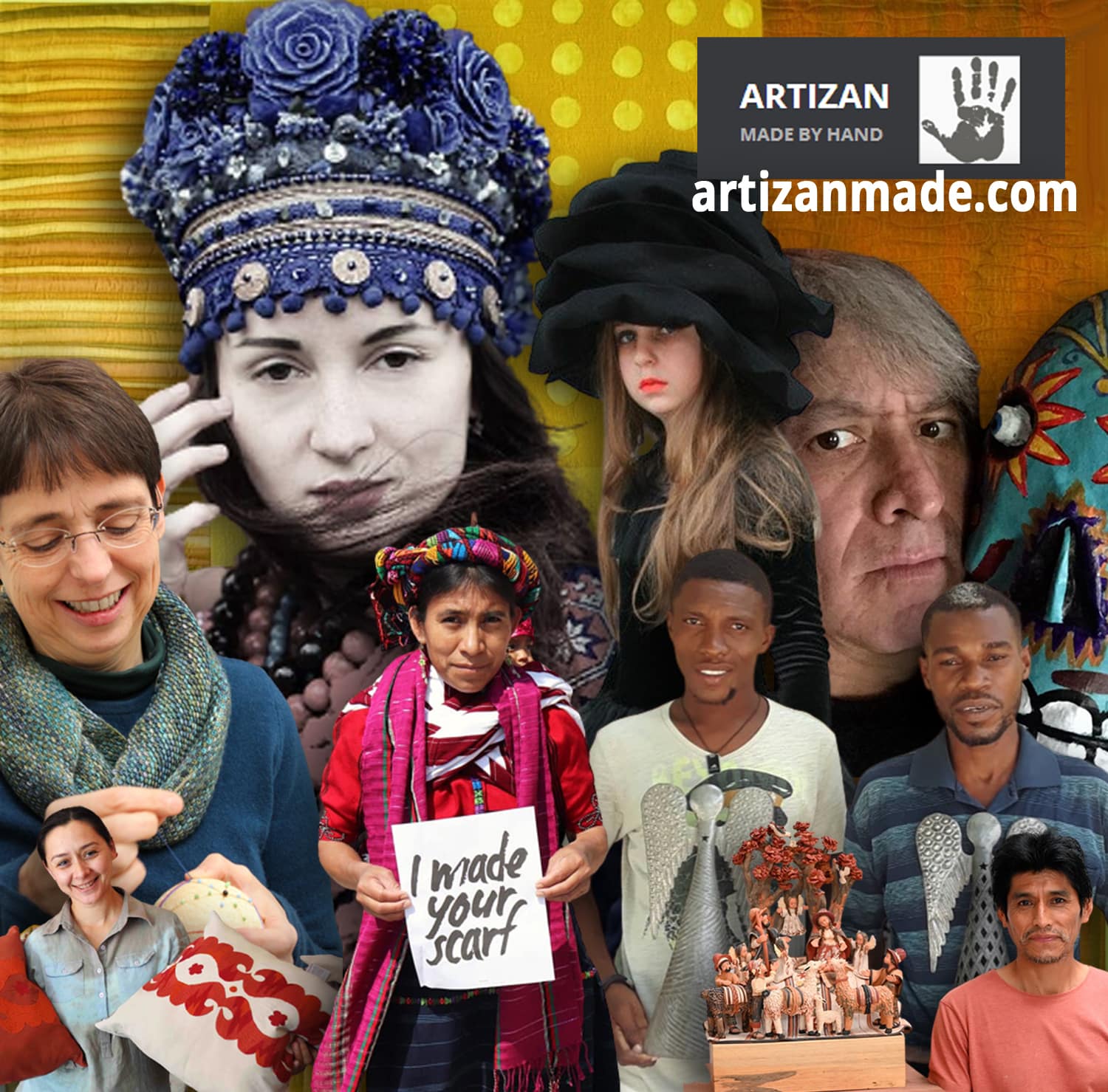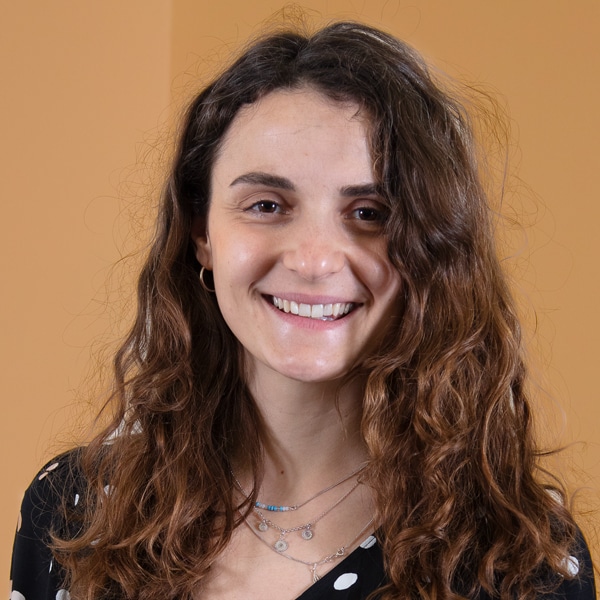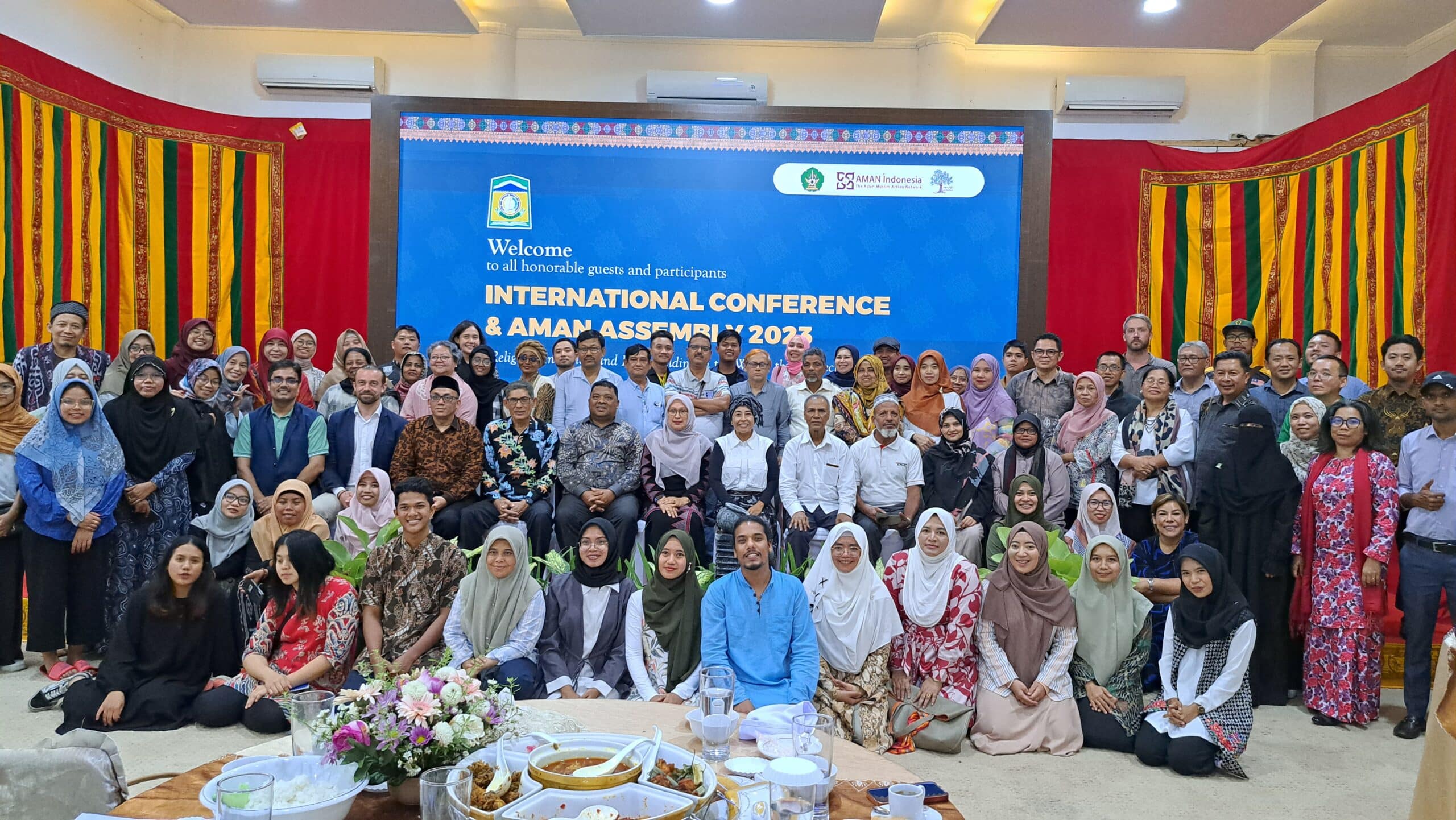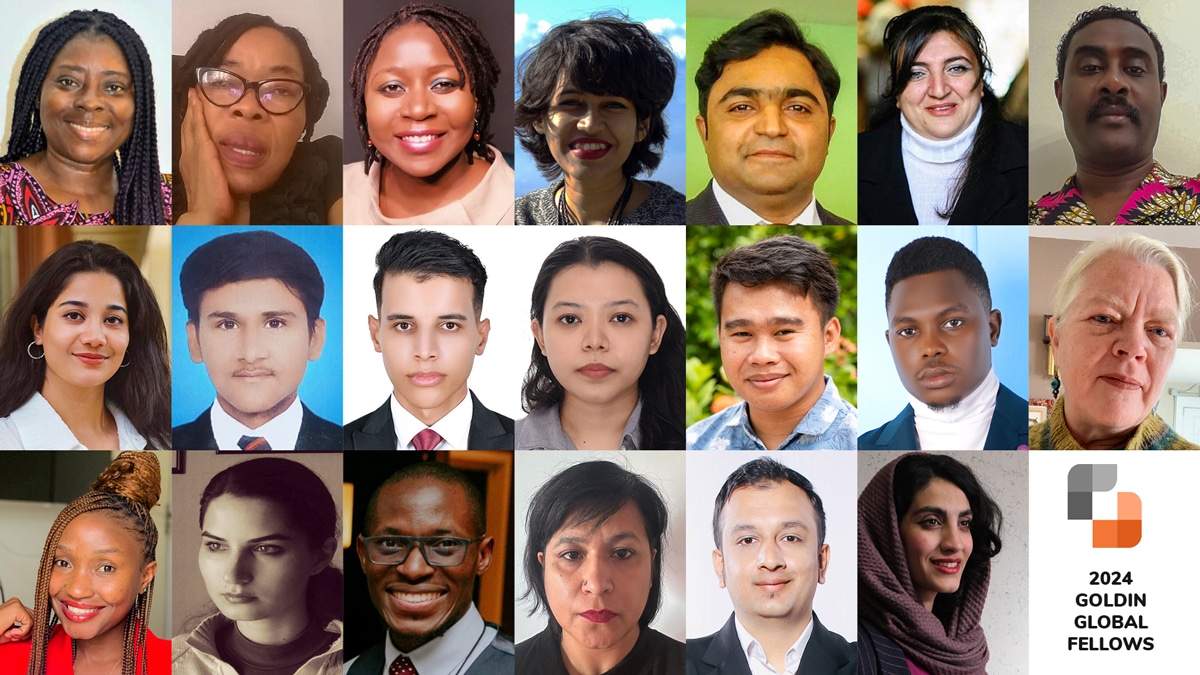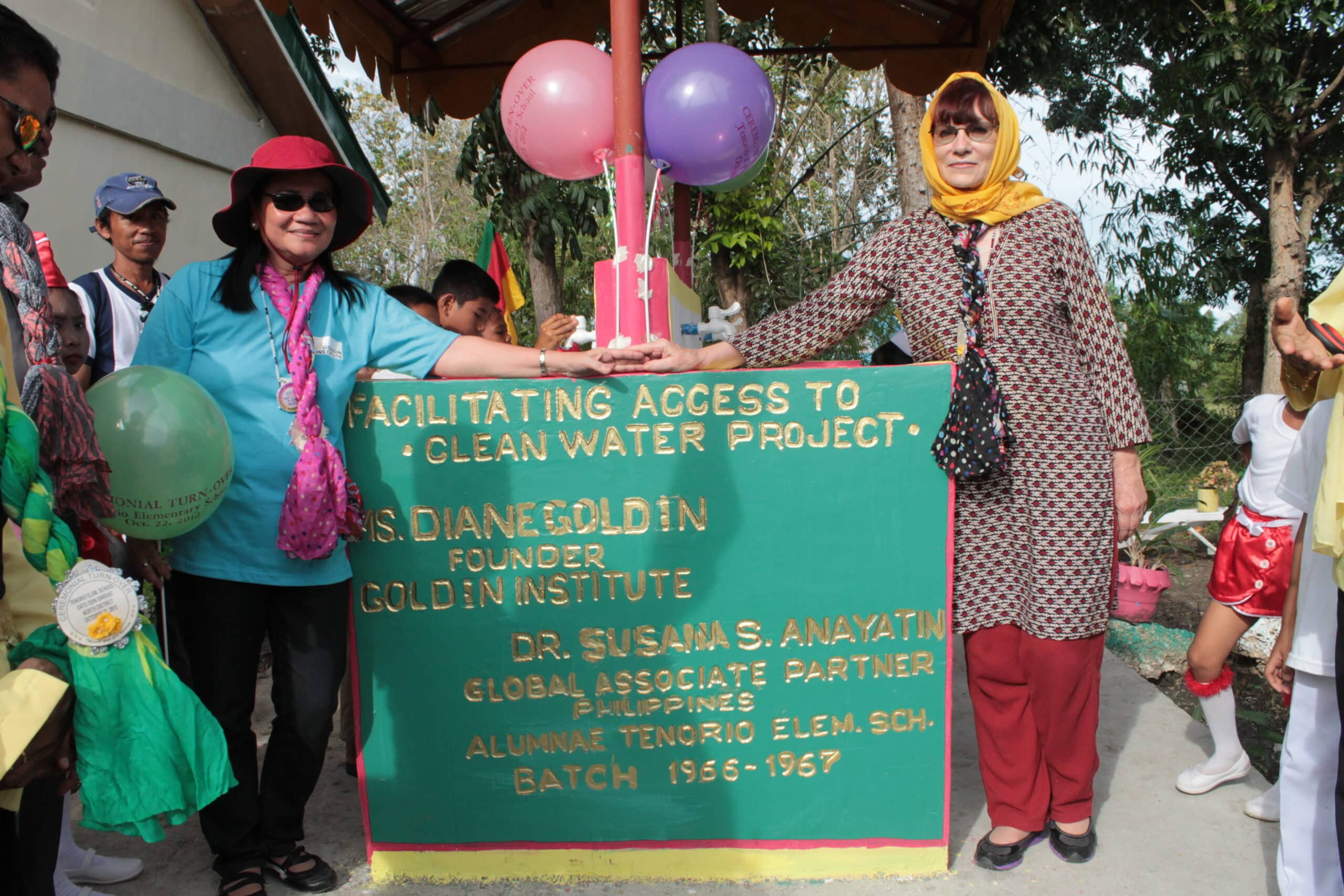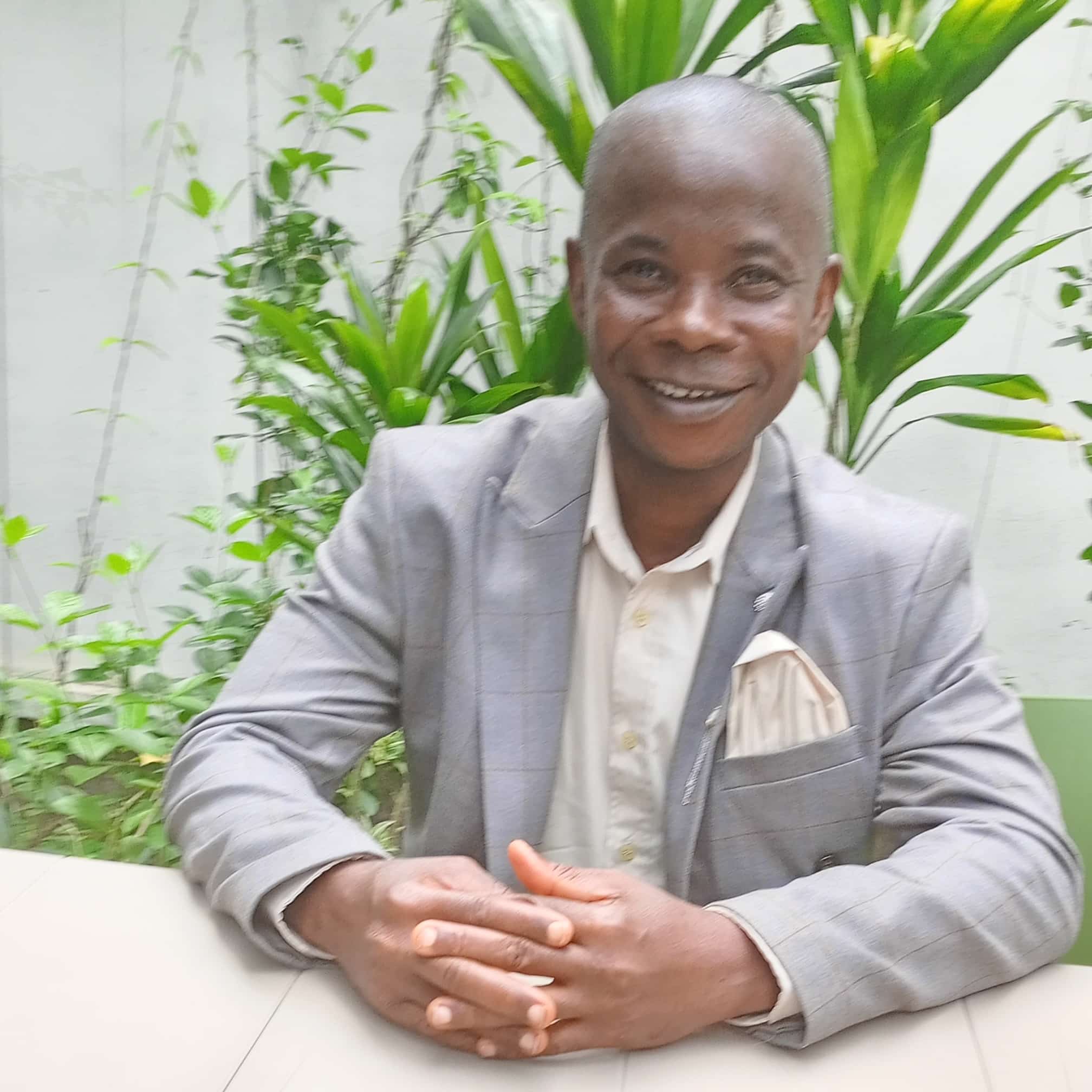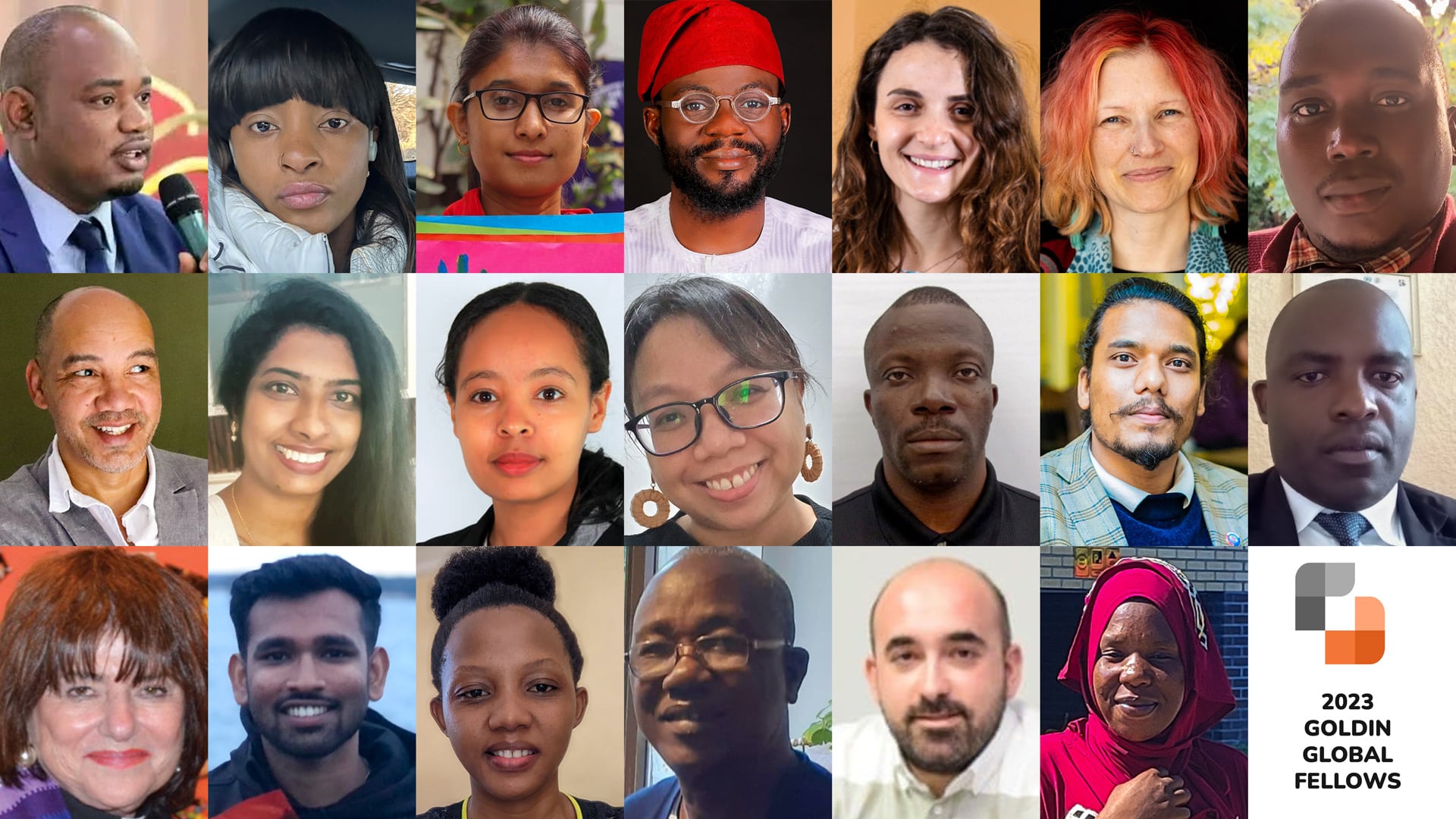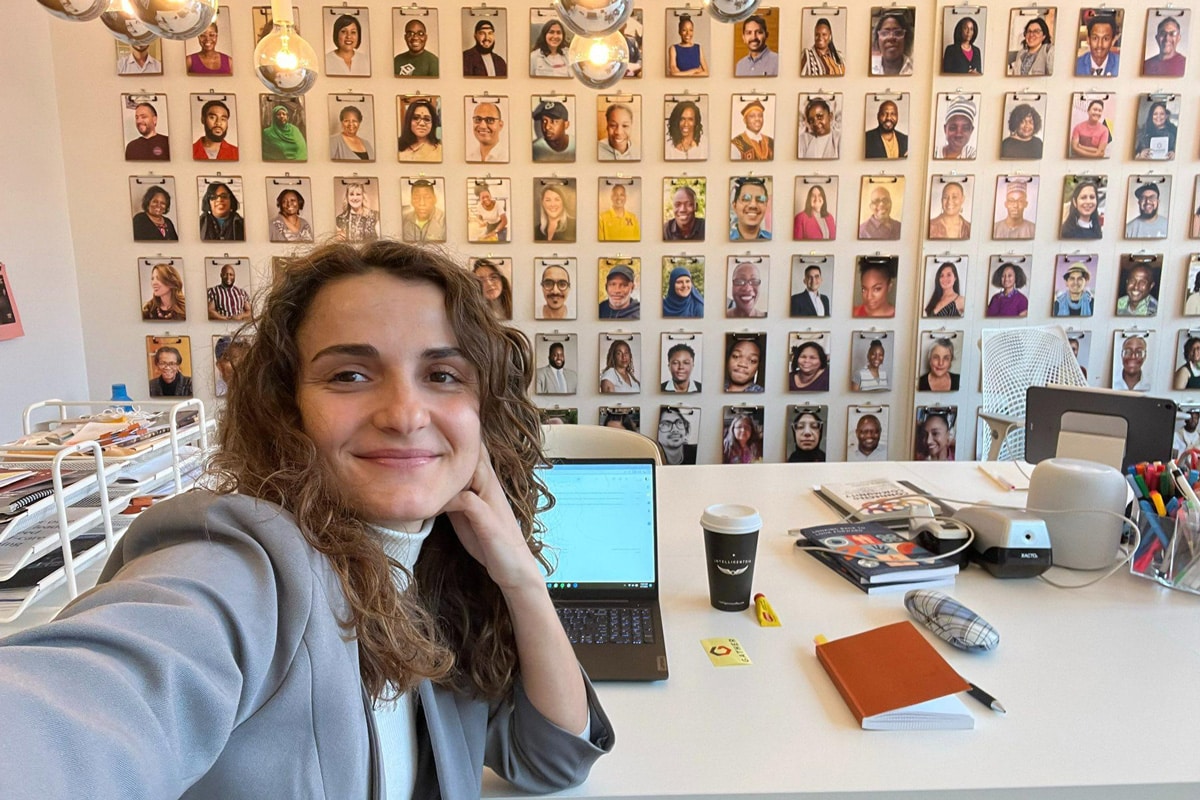Using Waste Through Activism and Art
Rachel Biel is among 20 2024 Goldin Global Fellows who, together, are learning and working as a Community of Practice. Learning from each-other’s experiences and utilizing the GATHER platform, they build on the talents of their neighbors and the assets of their communities to make real and lasting change in their communities.
Having just started her Fellowship participation, in this article, Rachel, the owner of Artizan Made in Kentucky, USA, shares the inspiration behind applying for the Goldin Global Fellowship and why this journey is already enhancing her three-decade-long work and activism.
She also introduces Artizan ReMade, a social project and study group dedicated to elevating human waste to the status of “material,” a resource everyone must use responsibly. The group advocates for creatives who can collect and use these materials to create new, long-lasting, valuable products.
Rachel grew up in Brazil and lived in a multicultural environment in Chicago for 20 years, and she aims to utilize the Goldin experience to contribute more to what is already being done regarding international communication and exchanges in her local community of Paducah, Kentucky, a Unesco Creative City.
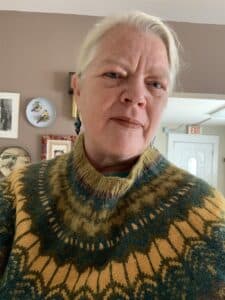
Meeting with Other Fellows, an Inspiring Encounter
She has been friends with John Zeigler, Senior Director of Programs at Goldin, for many years, which is how she first heard about the Goldin Fellowship as a place to meet like-minded people, inspire change, and be part of the change.
When asked about how she plans to implement Goldin’s lessons in her community, she highlights: “I want to bring my online communities together with my local ones in the spirit of creative placemaking models that have grown in the U.S. and other countries, where art is used as a means of economic development while bringing diverse people together in a safe and welcoming way.”
“Meeting the other fellows and going through the GATHER exercises is so interesting to me! I feel like I am still very much at the beginning of a journey, and learning about what the others are doing is truly inspiring!”
“I was so happy to see that several of the Goldin Fellows are working on sustainability as a focus, too. I want to learn more about their insights.”
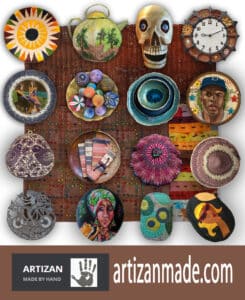
Artizan Made - Artists and Fair Traders Use Waste as Material
Artizan Made has 50 members who have online shops. About half sell on Etsy and the other half have their own sites. The goal is to help these shops with marketing and promote them on social media sites and wherever possible. Rachel hopes to grow the membership to around 200 shops, creating a diverse platform showcasing excellence in techniques and products. The historical narrative is vital as so many traditions are losing their masters, the keepers of the secrets handed down from generation to generation.
Rachel looks for talent that represents diverse communities from around the world. The product focus is on eco-fashion and home decor. She is looking for more representation of people of color and indigenous groups on the site. The Amiga Fund has been set up to help low-income applicants pay for their first membership year. She aims to showcase people working with sustainable materials, either grown (plant or animal) or upcycled from garbage. See membership info here if you are interested in joining this wonderful group! The Marketplace imports member products and then links back to their shops.
“When looking for members of my collective, Artizan Made, I have tried to bring in as many people as possible who also use waste in their creations. Garbage is out of control worldwide, and it is heartbreaking to see what we have done with the ocean, the air, and the land.”
Rachel, who has used waste as a material for many years in her own artwork, recently started a study group on Facebook, Artizan ReMade, focused on learning about why our global waste problem is out of control and how we can intercept the cycle, keeping usable materials out of landfills.
She believes that artists are very good at zooming in on a material they need and using it in huge quantities for their work. This includes used fabric, cardboard, metals, and everything we throw away or recycle.
“I thought it essential to study what is happening because the problem is beyond our imagination—it’s horrific! We are zooming in on one material at a time, and people can contribute their findings and share ideas along with their work. I hope that this will inspire local action in many places.”
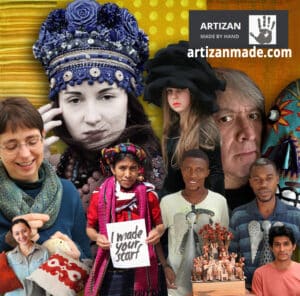
Artists Intercepting the Cycle!
The first topic the ReMade group explored was fast fashion. For this, Rachel draws attention to the harmful effects of fast fashion and the need to change. In this piece, she notes an important fact:
“More than 500 species of land animals are on the brink of extinction and are likely to be lost within 20 years; the same number were lost over the whole of the last century. The scientists say that without the human destruction of nature, this loss rate would have taken thousands of years, and they warn that this may be a tipping point for the collapse of civilization.” [Source: Earth.org]
Acknowledging the situation, Rachel emphasizes that people still have much to learn.
“I feel that I am well-read, educated, and aware, and there were so many things that I did not know, like the toxicity of the fibers that are used to make clothing in the U.S., including for children. There is very little oversight.” “There are piles of clothing in Chile and several African countries that are so big that they can be seen from space!” she adds.
A positive thing she learned about in the ReMade group is how many places are creating Maker Spaces that coherently organize these cast-off materials and make them available to the public.
“They also have fun activities like fashion shows that use waste, art events for kids, and so on. I would like to see this happen here in Paducah, and a couple of people have already expressed interest.”
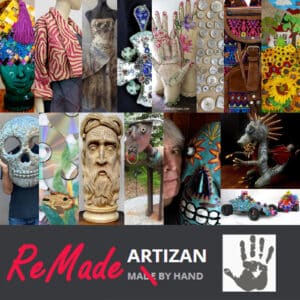
Global Awareness
The upcycling topic is just one of the angles she is looking at. “Another vital aspect is accessibility and visibility on the internet, especially for low-income and minority artists. This is a global issue. Every three years, everything changes online: social media trends, how websites are built, image sizes, and so on. Then, there are issues like housing, gun violence, drug use, etc., all creating stress in society and resources, and art has a role to play there, too.”
Several of the members of Artizan Made are living in traumatic times, with wars and violence happening in Ukraine, Israel, Guatemala, and Haiti, Rachel shares.
“These are the most volatile ones to which I have a personal connection. I feel that building connections across borders makes a difference where we can support each other and try to create systems that help the disenfranchised get the visibility they need to move forward with confidence.”
Networking with the Goldin Global Fellows has just strengthened this conviction, and Rachel looks forward to having these relationships last for many years: “It has been such an honor to be a part of GATHER, our learning platform! May we all move forward in the Light!”
Mapping a Community Vision in Sri Lanka
As part of her Goldin Global Fellowship, Sashikala Lakshman, from Sri Lanka, held her Community Visioning Summit in Rawathawatta East, an area just south of the capital Colombo. This gathering was designed to identify and address the prevailing challenges faced by this area collaboratively.
Participating in the 2023 Goldin Global Fellowship made Sashikala, who believes in our collective responsibility to safeguard children's rights, a more skilled community worker. She emphasizes the lessons from the asset mapping exercise under the Fellowship.
Speaking to the Goldin Institute, Sashikala highlighted the importance of the Fellowship lessons and the utilization of the GATHER platform in successfully implementing her event, which drew active participation from a diverse range of stakeholders, totaling approximately 50 attendees representing various categories.

A Sense of a Shared Purpose Among Diverse People
The Community Visioning Summit opened with a comprehensive overview of the Goldin Global Fellowship program and the Community Visioning Summit, elucidating the shared objectives and mission.
“In a spirit of inclusivity and community building, each attendee had the opportunity to introduce themselves, providing insights into their respective roles within society and their contributions to its betterment. This initial interaction fostered a sense of camaraderie and shared purpose among the diverse participants, laying a solid foundation for collaborative discussions and problem-solving throughout the summit.” Sashikala says.
She further elaborated on her goals to harness the assets and talents within her community to address the challenges effectively: “The primary objectives were to engage with community members, identify their most pressing issues, and collaboratively develop a concise three-month proposal for addressing these challenges while simultaneously constructing an asset map of the community.”
The summit was attended by a diverse group of community members including the Divisional Secretary of Moratuwa, Viharadhipathi Thero of the Rawathawatta temple, Moratuwa’s Probation Officer, the Principal of the Roman Catholic School, the Grama Niladari, the Chief Nursing Officer from the MoH Office, teachers and students from the Roman Catholic School, and as well as other community members. Additionally, respected elders from the community and staff at Sarvodaya, community-based development organization in Sri Lanka, contributed their valuable insights and expertise.

Asset Mapping - A Stronger Community Will for Change
Mapping community assets, a skill learned and discussed during the Fellowship weekly roundtables, proved to be a unique value during this event. Sashikala notes: “During the summit, the asset map that had been initially identified was presented, and participants were actively encouraged to contribute by identifying additional assets within their reach. This interactive approach enriched the asset map and sparked lively discussions among attendees.”
She further believes that because of the enthusiastic participation, the asset map and the summit demonstrated a shared commitment to community development and a genuine interest in identifying and leveraging the resources available to create a stronger, more resilient Sarvodaya and Rawathawatta East.
In addition to the initial asset maps identified before the summit, Sashikala shares how participants eagerly enriched the asset map. For instance, she brings valuable insights from crucial Sarvodaya representatives, enriching the asset map with various resources and services. “The manager of Sarvodaya's End Poverty Knowledge Center emphasized the significance of assets like Sarvodaya Central Library, SDGs Academy, End Poverty Knowledge Center, and Sarvodaya Institute of Higher Learning. These institutions were acknowledged for their pivotal roles in providing essential services to the community, fostering education, skill development, and knowledge dissemination.”
Some other additional assets identified after the summit are Vishva Niketan, Suwasetha Child Development Center, Roman Catholic School, Buddhist Temple, Sarvodaya Store, Probation Office, Grama Niladhari Office, and the engagement of community members, volunteers, children, and youth.

Stakeholders Appreciating the Initiative
At the summit, Sarvodaya's Vice President, Neetha Ariyaratne, highlighted the challenges experienced by low-income families and children due to the economic recession, including the alarming issue of parental drug addiction, which poses a significant threat to child safety in East Rawathawatta. She emphasized that Sarvodaya is actively involved in addressing these issues through orphanages and daycare centers and encouraged attendees to provide information regarding children in need of assistance.
The principal of the Roman Catholic school underscored the pivotal role of schools in identifying and addressing local problems, emphasizing that schools serve as microcosms of their communities, with children from diverse backgrounds and age groups. He advocated for securing the future of school children, expressing concern about the pervasive issue of drug-related challenges affecting their lives. Many disciplinary problems have been identified in their school, and the principal thinks that children and parents should be informed about this. He suggested that the parents in the Rawathawatta area should be made aware of these problems through entertainment programs.
Viharadhipathi Thero said that community support in solving these problems is minimal and that there should be more community participation in implementing programs. The members of Sarvodaya particularly pointed out that the involvement of children is significant in finding solutions to community problems because they are the ones who make decisions regarding the future of the country.

Infusing Positive Change Together
Sashikala emphasized the inclusivity of the event and the strength of a collaborative, participatory approach to addressing community issues. “Importantly, the summit was recognized as more than just another program; it was perceived as the starting point for concrete actions to tackle the challenges identified,” she adds.
Based on the reflections and feedback from participants, a network will be promptly established, including all attendees. “This platform will facilitate ongoing communication, ensuring that everyone remains informed about the program's future actions and allowing for continuous progress monitoring. This collaborative approach will be crucial in turning the identified challenges into actionable programs, driving positive change, and creating a brighter, more resilient future for all residents of the Rawathawatta East area.” She leaves us with a message of unity and hope by highlighting that people can enable change together.

Empowering Youth for Peacebuilding: A Goldin Global Fellow’s Activism
Mohammad Ayatulla Rahaman, 2023 Goldin Global Fellow and the National Director of Nepal Unites, reflects on his learnings from the Goldin Global Fellowship and shares more on the Interfaith Youth Peacebuilding activities he participated in India, Thailand, and Indonesia Assemblies. These experiences strengthened his advocating skills and global connections.
Mohammad emphasizes how these events nurtured dialogue and solidarity among young people regardless of their differences. Speaking to Goldin Institute, he highlights the invaluable role of youth leadership in tackling global issues collectively. He also shares his firsthand experience with the Goldin Global Fellowship and how it offered him a seat at the table among other grassroots leaders worldwide.
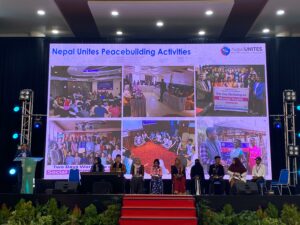
Youth as Community Changemakers and Peacebuilders
Mohammad, who has over 17 years of experience in leadership as a facilitator and mobilizer, was invited to two significant events: the Pacific Alliance of YMCAs (APAY) Assembly in Chennai, India, and the Peace Conference in Chiang Mai, Thailand, in September 2023. He shares some valuable insights from these two esteemed programs: “Both programs were motivated by the passion for seeking to contribute to peacebuilding efforts in Asia, particularly in conflicted areas […] The assembly's theme was ‘Journeying Together as a Resilient Community: Transforming Lives Through Vision 2030.’ The 21st General Assembly of the APAY offered a perfect atmosphere for insightful discussions on integrating and enacting Vision 2030 across different grassroots communities in the Asia Pacific region through our actions to bring the vision to existence.”
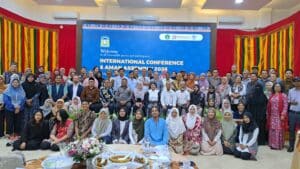
Aceh, Indonesia.
He acknowledges how vital youth leadership roles are for young people committed to collectively confronting these global issues. “The youth assembly offers young people an environment for fostering dialogue and chances to promote solidarity among young people from various ethnic and social backgrounds.” The theme of the Peace Conference was “Towards an Empowered Asian Interfaith Youth Network for Peacebuilding.”
My team and I opened our booth, where peacebuilders from other countries came to explore how we work on peacebuilding activities. I also learned from their presented engagements. Since most participants were ICF (Interfaith Cooperation Forum) alumni, we discussed issues threatening Asia’s peace and harmony.
-Mohammad Ayatulla Rahaman
Among the lessons, he shares how these activities helped him elevate their advocacy and work while collaborating with other organizations to promote peace at the national and regional levels: “The youths in both the Indian assembly and Thailand Peace Conference events released a collective statement outlining their vision for Asia's conflict transformation and promotion of peace.” While in Thailand, he received an invitation letter from the Asian Muslim Action Network (AMAN) to be one of their speakers during the International Conference and Assembly that was to be held in Banda Aceh, Indonesia, in October 2023, at the Ali Hasyimi Auditorium. At the conference, Mohammed presented "Reinventing Nonviolent Civil Resistance: Youth Peace Movement and Technology" to 400 delegates from 21 countries.
I spoke on the power of nonviolence, how it coexists with violent and nonviolent protest in the context of Nepal, and the use of technology in advancing peacebuilding. I also highlight the contribution of the Global Unites as a Youth Peace Movement and how it works for peace and reconciliation.
-Mohammad Ayatulla Rahaman
All these conferences and assemblies from India, Thailand, and Indonesia highlighted a teaching of respect and non-discrimination of people regardless of race, ethnicity, gender, and religion. Mohammad firmly believes that norms such as respect, appreciation, and solidarity among different cultures and religions can contribute to a more peaceful world: “These tributes and values also support one another in need and can strengthen community ties.”
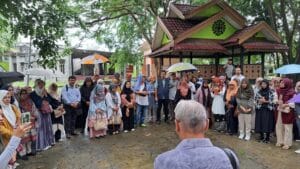
the victims of Aceh tsunami in 2004. The prayers were led by the Catholic priest and Muslim leader together with the delegates.
Global Goldin Fellowship a Great Platform for Sharing and Learning
Mohammad, with his team at Nepal Unites and other non-profit organizations, also organized an event for International Youth Day, focusing on the theme "Inspiring Youth.” “Inspiring Youth is a series where we invite the youth motivational speaker or the peace who has a success story that gives hope and inspires the youth to do something for social transformation”, he says.
His experience as a Global Goldin Fellow influenced his role in organizing the event for International Youth Day. “Being a part of the Global Goldin Fellowship was a great platform and opportunity to share our events and activism with our Fellow team members about our social activity and what we all are doing in our countries.” He adds that during the Fellowship, he met changemakers from 19 countries: “Although we are from different countries, our challenges are very similar to each other. We learned and shared the experiences of our countries.”
The Global Goldin Fellowship gave me the responsibility to stand for my passion for social change.
-Mohammad Ayatulla Rahaman
For Mohammad, the GATHER platform was very user-friendly, and it perceived the message of informal learning as a global family. Being a part of other community activists was vital for him, as he believes that social transformation does not happen overnight; it takes time. “For this [to achieve positive social change], all grassroots leaders must continue the initiation with passion and commitment.” Reflecting on his journey, he advises young, motivated people to persevere despite challenges. Conclusively, Mohammad adds: “Building peace is like picking up small pieces of things we build collectively to make it whole.”
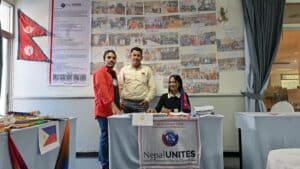
Chiang Mai, Thailand.
Building Water Pumps, Peace, and Community
Dr. Susana Salvador Anayatin, a member of the Parliament of the Bangsamoro Transition Authority in the Philippines, has partnered with the Goldin Institute since its launch in 2002. Beginning with water pump installations in rural communities, Dr. Anayatin has since paved a path that is a testament to growth, positive change, and tireless activism in helping her community with peace and development initiatives through her community activism, institutional work, and joining forces with the Goldin Institute. Her engagement with the Goldin Institute inspires her to become more passionate about working for the welfare of the orphans and widows of war and the underserved sectors of our society.
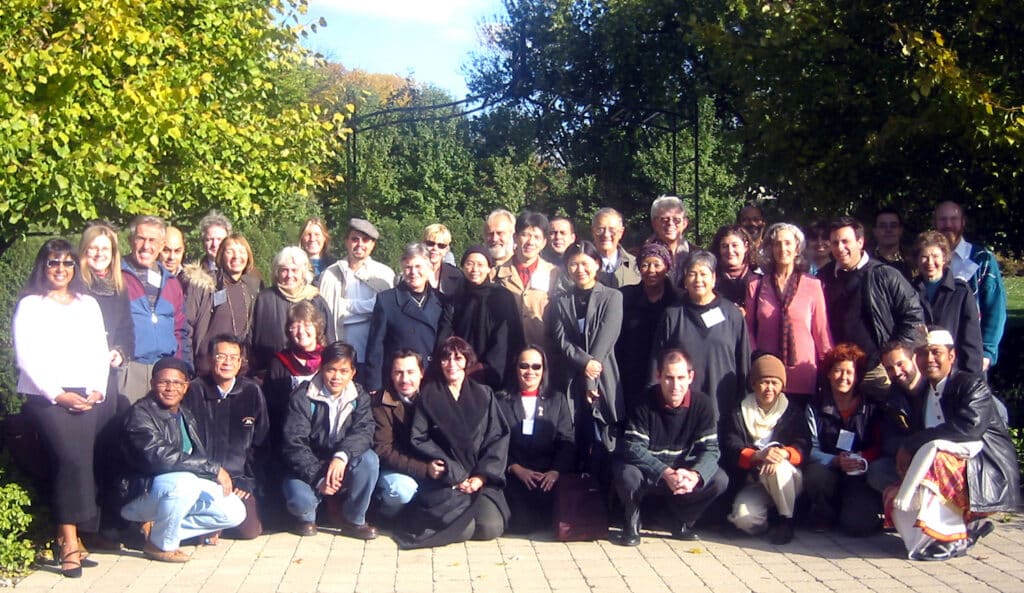
On a personal level, as a global associate of the Goldin Institute, Dr. Anayatin learned to become a global citizen by engaging with people from different countries. In this interview, she dwells more on these and how her motivation stems from personal tragedy, which she turned into strength and courage. She also touched upon impactful initiatives in the Philippines, emphasizing her transformative journey and dedication to peace-building efforts.
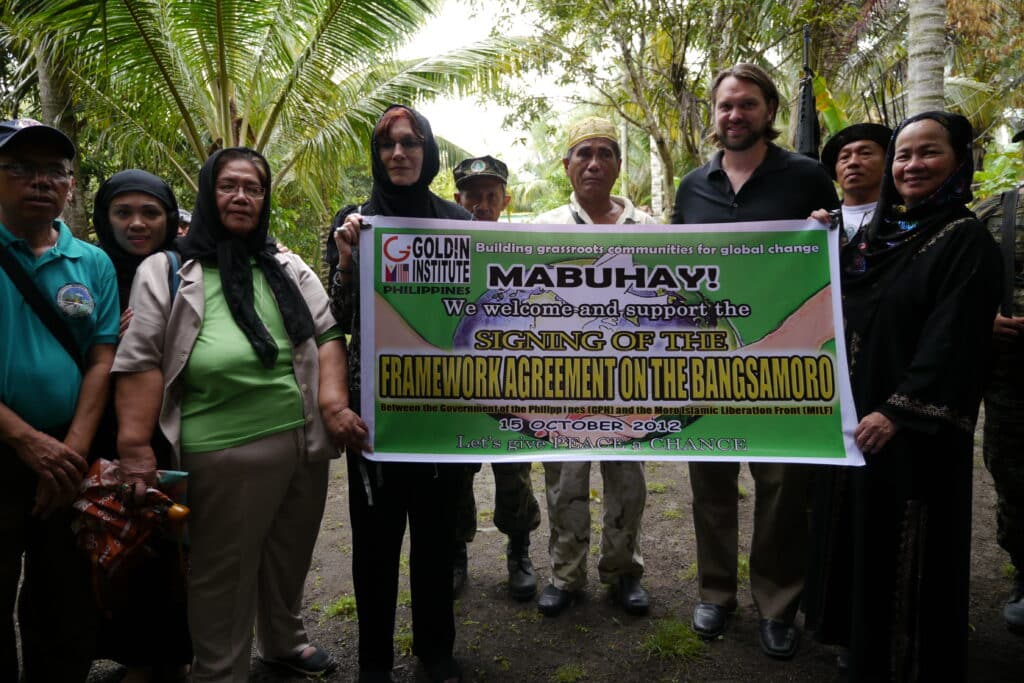
Journey with Goldin: Installing Water Pumps and Community Development
At the beginning of our conversation, she acknowledged that she gained education and skills in engaging with the Goldin Institute since partnering with grassroots communities. “I had a change of mindset. I now believe that peace and development are shared responsibilities between governments, private sectors, and grassroots communities, as they are all stakeholders of peace and development.”, she says. “I learned that through partnerships, we will yield more resources and services for the unserved and underserved in the communities.” Her values for volunteerism were also strengthened, alongside a more vital willingness to share skills to change lives, especially the out-of-school youth and illiterate adults.
She speaks about one initiative that evolved as part of the Goldin Institute’s work and its impact on helping the community with water pumps. “I was able to participate in a Goldin Institute Event in Taiwan about the provision of clean water, after which our team partnered on a project to provide water facilities in conflict-affected areas in Mindanao", she says.
Since that project, Dr. Anayatin has taken the installation of water pumps into her own hands. In three years, her organization installed about 430 water pumps in different schools, serviceable to school children and the adjoining communities. “This time, as a Member of the Bangsamoro Transition Authority Parliament, I could sustain the water project by saving some funds from our office. Since last year, we have constructed five water sources with hygiene and sanitation facilities in remote villages.”
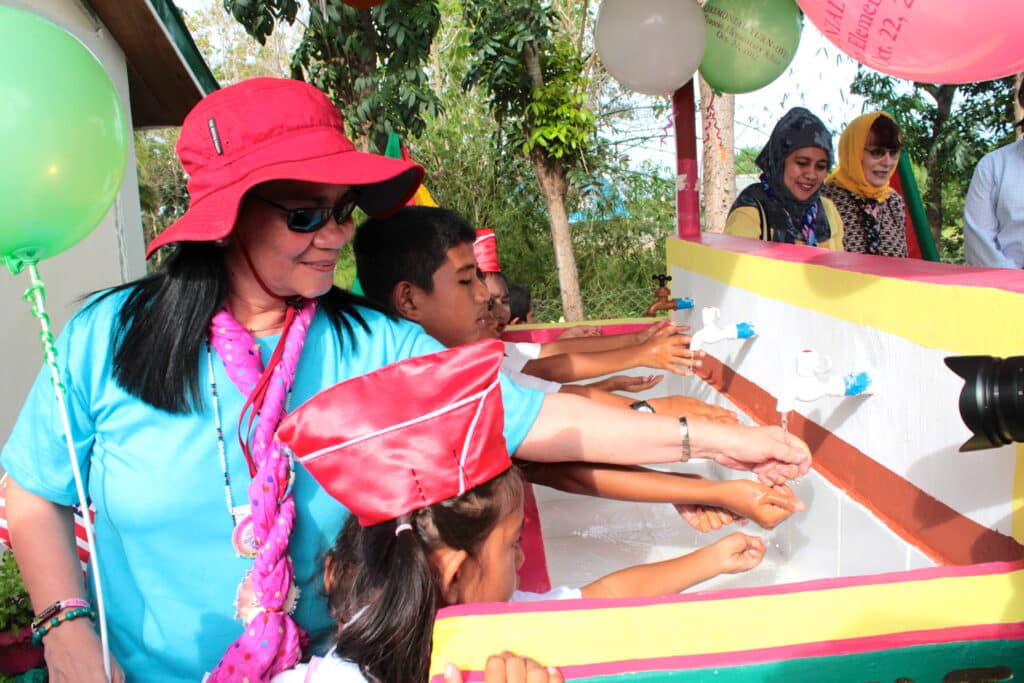
She is fortunate to have attended another Goldin Institute event about child soldier prevention in Colombia. “As a war orphan, I have been passionate about sharing some basic needs with war orphans here. We solicit food, school supplies, medicines, and clothes and bring them to orphanages. This time, since I have some sources, we take care of four orphanages, one home for older people, and a dormitory for disadvantaged students.” She further adds: “We are taking care of these war orphans because of their vulnerability to being recruited as child soldiers if they are left unschooled and homeless.”
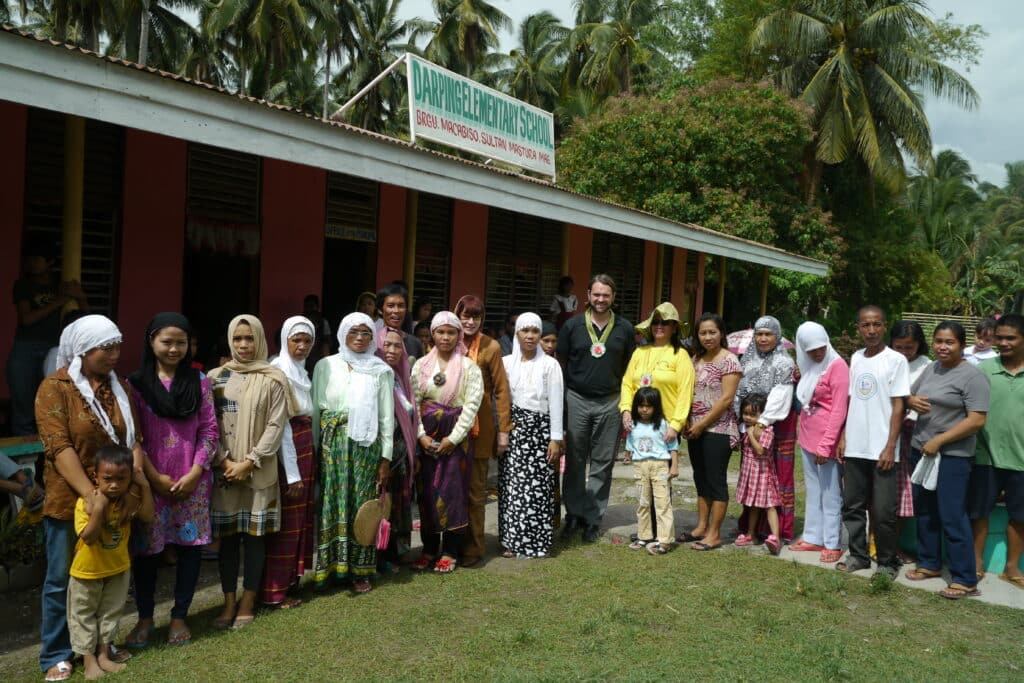
Turning a Personal Tragedy into Community Strength
Her motivation to get involved in peace and development work has its roots in a family tragedy- to which she did not surrender. “I am the daughter of activists who fought alongside the Americans against the Japanese Imperial Army during World War II. I became a war orphan because our father was killed in front of us in our house at the early stage of the armed conflict here in Mindanao.” Life has not been easy for her. “I had to work hard for my high school and college education at the backdrop of the armed conflict.”
Her brother, a policeman, was also killed brutally at the height of the kidnapping in Mindanao. “Despite poverty, I was able to finish college and landed a job in government. The loss of a father and a brother inspired me to join groups that advocate for peace, justice, human rights, and peaceful resolution of conflicts.”
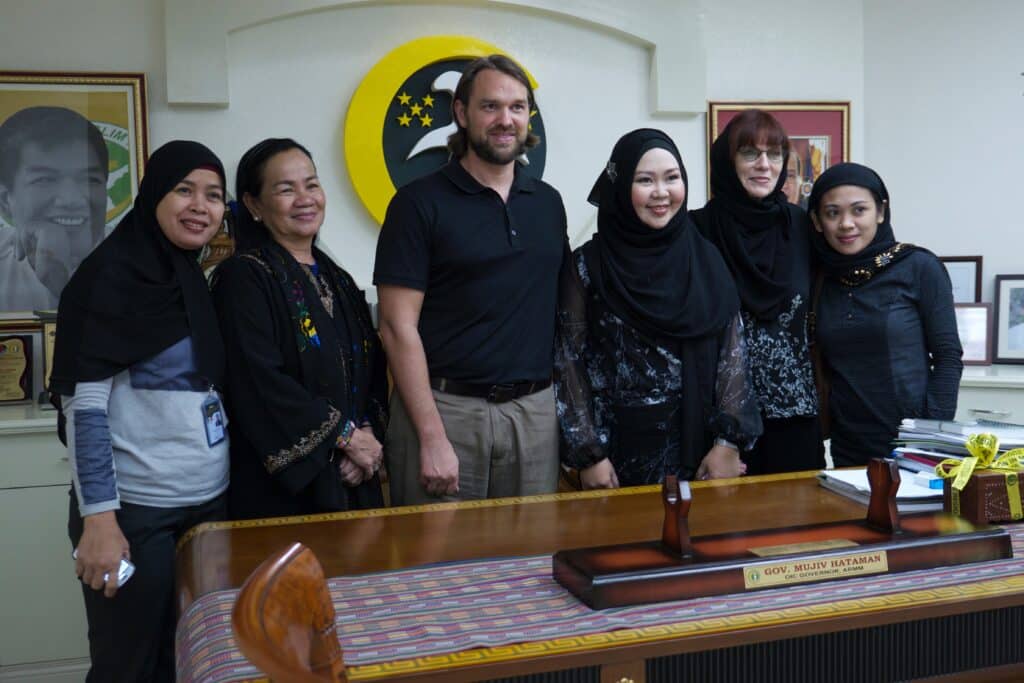
Sharing Decades of Learning: Peacebuilding as a Shared Vision and Dream
Dr. Anayatin shares with us also a key lesson she learned during her community-led peacebuilding work and efforts. There is a particular reaching that stands out to her as transformative. “I learned that peace is possible and that peacebuilding must not be dictated but a shared vision, dream, and passion where the stakeholders walk together along the journey.” She highlights that peace could be a lifetime process as a way of life.
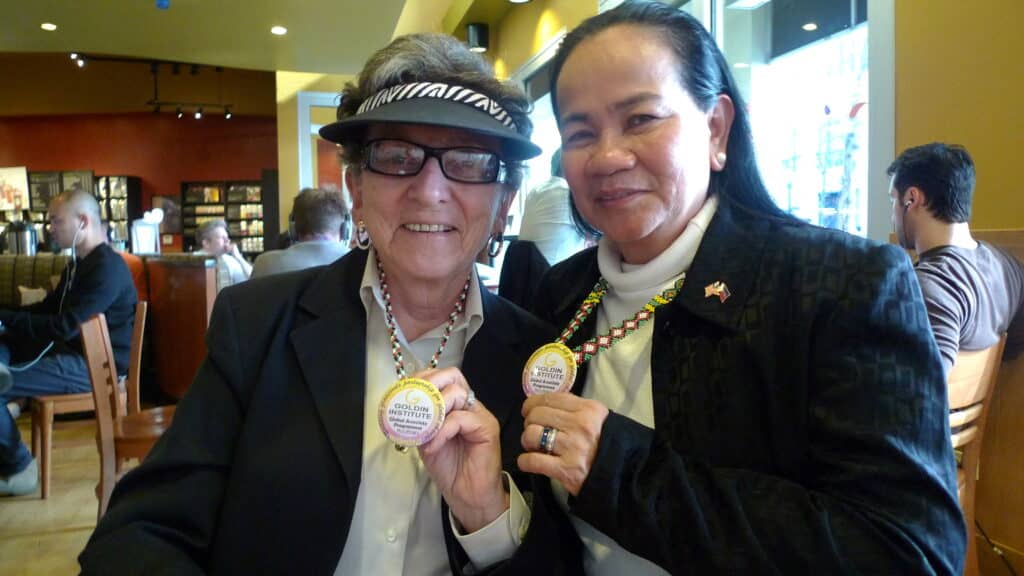
Speaking from her experience, she shares a mindset from which individuals and organizations working in peace can benefit. “Consultation must be conducted in project and activity planning. The environment of the communities is vital, from planning to implementation and monitoring of projects/activities to establishing ownership and sustainability.” she says. She draws attention to a crucial matter in the peace-building process and collective efforts to achieve that. “Peacebuilding is contextual. Culture, traditions, behavior, values, arts, et cetera matter and should be considered. Further, peacebuilding is a crucial factor for the success of peace initiatives.”
Spreading a Message of Hope and Unity
As the Goldin Institute recently celebrates its 21st anniversary, she notes the organization's most significant achievements. “The Goldin Institute created a platform for peace practitioners, academics, students, youth, and women to share knowledge, articles, and experiences in peacebuilding, conflict prevention, and post-conflict reconstruction. It established connections and reached people far beyond borders, especially in countries experiencing armed conflict and violent extremism. [...] People are interrelated regardless of creed, religion, ethnicity, political beliefs, and orientation. My experiences at the Goldin Institute allowed me to overcome the feeling of victimhood.” Concluding on a positive note, she recalls that now she enjoys a more peaceful life and is willing to journey and walk together with people from all walks of life.
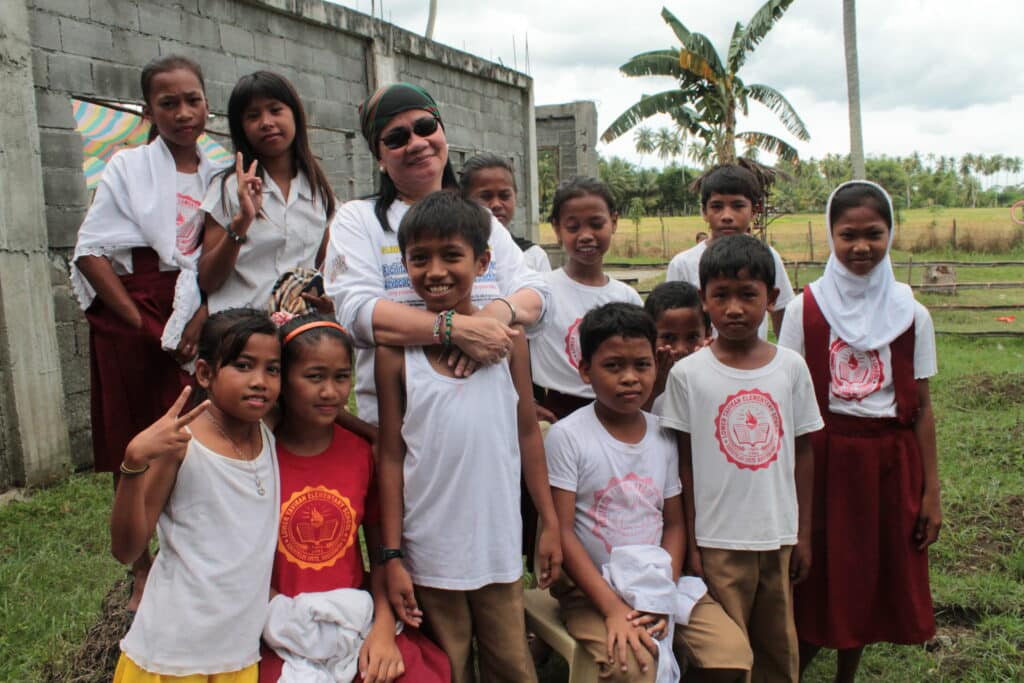
About Dr. Susana Salvador Anayatin:
Dr. Susana Salvador Anayatin pursued postgraduate studies in Peace and Development that enhanced her peace-building skills. She currently teaches Peace Education, both formal and informal, and one of the subjects is Conflict Resolution and Prevention of Violence Extremism. Most of her students and participants are youths, and she partners with local NGOs and the military since violent extremism is still an issue in Mindanao.
Transcending Borders: Two Fellows Helping U.S. Trafficking Survivors Become Financially Literate
Two community activists, Jill Langhus-Griffin, the Founder of Liluye from Arizona, and Tarun Masapeta, the Founder of Project Educate India Financially (EIFL), from India, first met virtually in June, during the first weekly roundtable of the 2023 Goldin Global Fellowship. With other peers from around the world, during the Fellowship, they discussed their own communities' most emergent needs and ways they can play an active role in establishing and maintaining community-driven social changes. These discussions and utilizing the GATHER platform brought them closer to their shared goals for a better society.
After a joint meeting in August, Jill and Tarun met in person in Phoenix, Arizona, to dig deeper into a possible partnership between their two organizations to create a financial literacy program for trafficking survivors in the U.S. With a plan to tailor it to other areas of the world who could benefit from this training afterward, Jill and Tarun have forged a collaboration to empower trafficking survivors in the U.S.
Through this collaboration Project EIFL X Liluye was born to address the unique financial challenges faced by trafficking survivors in the U.S. The project spans an 8–10-week timeframe for approximately 8-10 participants. It features up to eight financial topics taught in 45-minute, separate Zoom workshops. Their endeavors in this joint initiative reflect the power of community-driven initiatives in tackling such issues.
Joining Forces to Help Trafficking Survivors Become Financially Literate
At the beginning of our conversation, they shared why the creation of this program was essential. From her experience and activism, Jill knew that survivors, especially those she knew in the U.S., have challenges around re-establishing their credit and becoming financially independent. “When Tarun and I first met and chatted online in July, and I found out that he had been offering other organizations education in financial literacy and other things, I realized there was an opportunity for collaboration.” Jill says. "To continue the mission of my project, it felt like a good intersection to integrate our ideas and bring the EIFL curriculum to trafficking survivors in the U.S. Jill gave me a little insight into how a lot of trafficking survivors usually end up losing most of their assets if they have any and their belief in themselves." Tarun says. Jill elaborates that traffickers often taint survivors' credit, thus making it hard for them to become economically empowered. “Providing a basic course on personal financing would be a good start to help these survivors get back on their own feet.” Tarun adds.
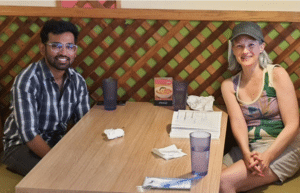
Goldin Global Fellowship as the Meeting Place
Jill and Tarun shed light on how their participation in the Global Goldin Fellowship played a role in the development of this program, considering one of them is from the U.S. and the other from India.
"If I had not been part of the Goldin Fellowship and had not been reaching out and interviewing other Gather fellows in our cohort, such as Tarun, I would not have known that there was an opportunity for collaboration on this financial literacy program."
- Jill Langhus-Griffin
She adds: “When Tarun and I were talking about Liluye and what my vision, plan, and goals were for it, and Tarun was talking about his organization, Project EIFL, it occurred to both of us almost simultaneously that there was an opportunity to collaborate and make more impact together.” Tarun also acknowledges they would not have joined hands in this collaboration if it had not been for the Goldin Global Fellowship: "Jill and I connected right before I left for the U.S. on a Zoom call where we discussed our work and how we felt there was a lot of scope to collaborate. We also met in person in Phoenix, Arizona, to discuss our expectations and set the ball rolling by laying out a blueprint." Even before this Zoom meeting, Jill was impressed by Tarun’s ambition, likable personality, and enthusiasm for impacting and helping others. “So, when we met on Zoom, it was not strange to me to ask him if he would be interested in collaborating on a financial literacy project/program together.” Jill says.
What does the project cover? What's its impact?
The Project EIFL X Liluye program will cover these areas that survivor colleagues and team members identified as being essential topics:
- How to open a bank account (step by step)
- How to calculate taxes (where to set them aside, where to put them, how to reinvest them, how to do balance sheets, and what is taxable)
- How to invest
- How to reinvest in their business (how to start anew as an individual and/or business)
- Organizational financial literacy (when given a lump sum and financing their own organization)
- How do they pay themself (not out of a business account)
- Where to put their money (what to budget in, what to spend on, and what percentage to take out)
- Financial Aid (for anyone considering going back to school).
Conclusively, they share what impact they strive to achieve through this project, both for the survivors and the broader community. Tarun says the project aims to teach financial literacy basics, allowing individuals to make learned decisions.
"Our goal collectively is to ensure that all attendees have a good understanding of topics we would discuss and that they are being in practice."
- Tarun Masapeta
He highlights that this marks EIFL's first project in the U.S., making it the 5th country outside India to facilitate financial literacy workshops. Jill, who is always looking for the best, most impactful ways to serve and help survivors, shares her thoughts on what this project means for the survivors. “It occurred to me that all survivors I know share a common concern about lack of funding. With this training, they potentially would not need to struggle anymore in this area, and they could become more empowered by having control over their finances and, in turn, their lives.”She hopes that all the survivors that attend the program will gain clarity in all the topics covered, that they will feel confident and empowered to take control of their finances or more so than they were before the program, and to build the organizations that they are planning to or feel more confident in controlling their organization’s finances after taking it.
Jill and Tarun are among 20 community activists who participated in the 2023 Goldin Global Fellowship, living and working in Albania, Bangladesh, Burundi, Cameroon, Ethiopia, India, Kosovo, Malawi, Mali, Nepal, Nigeria, the Philippines, Senegal, South Africa, Sri Lanka, Tanzania, the United States and Zimbabwe.For five months, this diverse group of fellows worked together as a Community of Practice, building on their neighbors' talents and their communities' assets to make real and lasting change around the world.
Twenty More Reasons for Hope! Celebrating the graduation of the 2023 Global Fellows
What’s your reason for hope?
As a grassroot leader with a commitment to learn and partner with my neighbors to transform our lives, this question becomes more critical in challenging times. Times when my society is beset with climate related disasters in Northern Tanzania — taking over 63 lives and destroying homes. Times when education, public health, and infrastructure fail to meet the aspirations of people. And, when global efforts, such as COP 28, struggle in translating agreements into action.
In the face of such disappointing realities, finding solid reasons for hope becomes a survival mission for me. I believe the meaningful actions I take today have the potential to inspire others to act together for shared progress. I am lucky to be working with the Goldin Institute, whose mission of building grassroots partnerships for global change, allows me to participate in cultivating more reasons for hope.
Between June and November this year I participated in creating a space for 20 grassroot leaders from 19 countries to learn and work together on addressing tough issues experienced in their communities. They gathered from Albania, Bangladesh, Burundi, Cameroon, Ethiopia, Haiti, India, Kosovo, Malawi, Mali, Nepal, Nigeria, Philippines, Senegal, South Africa, Sri Lanka, Tanzania, United States of America, and Zimbabwe.

“I realized that we have a oneness in our aspirations. One common dream to make our communities better. We are united in that. Learning from everyone’s work in their communities was very impactful.” — 2023 Goldin Global Fellow from Nigeria, Godson Nwanko
Building on Talents & Assets
For 22 weeks we explored the GATHER curriculum, which is designed for people who want to build on the talents of their neighbors and the assets of their communities to make real and lasting change. We reflected on a set of big ideas for promoting community driven social change. We tested each idea locally with our learning partners and reflected on the outcome of applying each set of ideas at the weekly roundtables. This process gave rise to peer-to-peer learning and further enriched our collective learning experience. Furthermore, this approach opened doors to collaborative possibilities—an outcome which led to some real collaboration taking place.
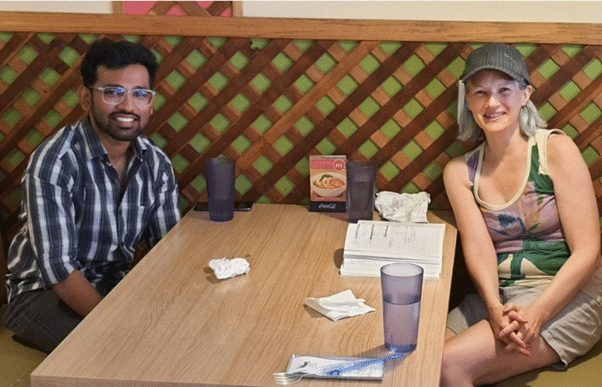
While the learning space was virtual, each learning outcome was complimented by practical applications of the ideas and concepts in the real world to strengthen organizational skills and hone new outreach techniques. Grassroot leaders involved adapted themes like Asset Based Community Development and Community Visioning Summits to find solutions specific to the context of their countries.
In the photos below, grassroot leaders from Bangladesh, Burundi, Nepal and Sri Lanka led an asset mapping exercise to identify gifts, talents, and resources found in their communities. They engaged respective community members in the process and together reflected on the connections and emergent possibilities existing assets can reveal in meeting shared aspirations.
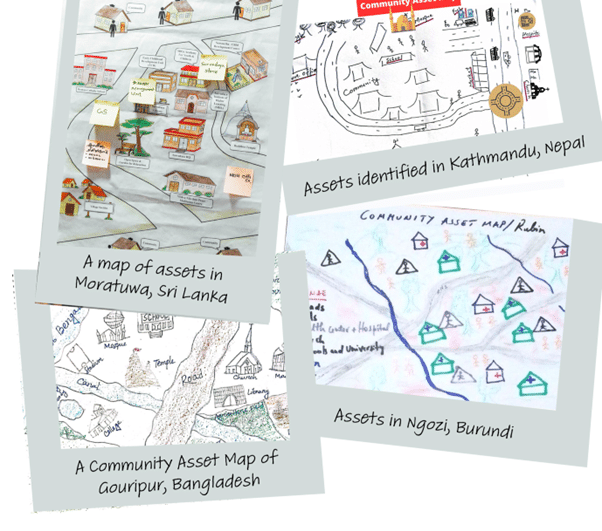
“I have already started applying what I learned during the Gather program. In my hometown, we now use the Asset Based Community development method to approach our social issues”—2023 Goldin Global Fellow from Albania, Nensi Dragoti
From the asset maps developed, the grassroot leaders hosted visioning summits inviting members of the public, especially those living closest to the issues and often missing from official community meetings. Together, they expanded the scope of their asset maps with the help of new ideas from community members. They applied the Appreciative Inquiry technique to come up with new visions for their communities. Visions that inspire neighbors to voluntarily work together to bring the change they want to see.
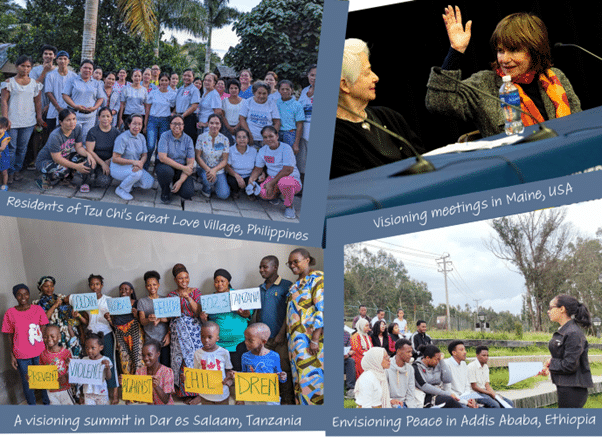
A Community of Practice
On the 22nd of November 2023, these 20 grassroot leaders from 19 countries finally graduated from this year’s cohort—making it a fifth cohort since 2018. They are now joining a community of practice of the Goldin Global Alumni Network composed of 212 grassroot leaders from 53 countries. The mission of the Goldin Global Alumni Network is simple: promoting shared learning through expanding the Gather curriculum and deepening relationships to create collaborative opportunities.
I invite you to learn more about my 20 reasons for hope by reading each of the 20 grassroot leaders I had the privilege to learn and work alongside this year on this article, meet the 2023 Goldin Global Fellows. While it is easy to lose hope in the face of ongoing conflicts in Ukraine, Gaza, etc. I invite you to look at what talents, gifts, and connections you have in your local community. See if you can invite your neighbors to explore the connections between these assets and the possibilities that could emerge if you collectively tapped on those assets to address issues that matter the most in your community. You also have the power to be the source of hope!
“I hope to become a more unbiased, effective and efficient leader and role model for others, making more impact for a more equitable world.” —2023 Goldin Global Fellow from Arizona, USA, Jill Langhus-Griffin
Get in touch with us to learn more, connect and partner with individual grassroot leaders to support their work. Sign up here to receive periodic news from the Goldin Fellows in 52 countries. You can support our community of practice —Goldin Global Alumni Network—at this donation page. Become the reason for hope, the world needs more hope!
Mobilizing Communities to Combat Organized Crime
John Kamma, a 2021 Global Fellow from Liberia, recently participated in the sustainability discussion and capacity-building sessions of the West Africa Regional Network on Organized Crime (WARNOC) in Cote D’Ivoire, West Africa.
John, a fantastic community activist and the Founding Executive Director of the Citizens Bureau for Development and Productivity in Liberia shares his insights from this journey and how confronting issues such as organized crime and human trafficking requires a community-based response.
Drawing upon experiences, observations, and productive initiatives witnessed during his trip to the region, he emphasizes the importance of empowering local communities to combat organized crime. Further, John recalls his experience as a Goldin Fellow and what lessons he still carries with him. He acknowledges that the fight against organized crime, especially in low-income communities in West Africa, calls for a multifaceted approach that empowers communities, engages civil society actors, leverages partnerships with relevant institutions, and secures vital resources for people in need.
In this article, he speaks on the critical role of listening communities closer to the issue and igniting social change from the bottom.
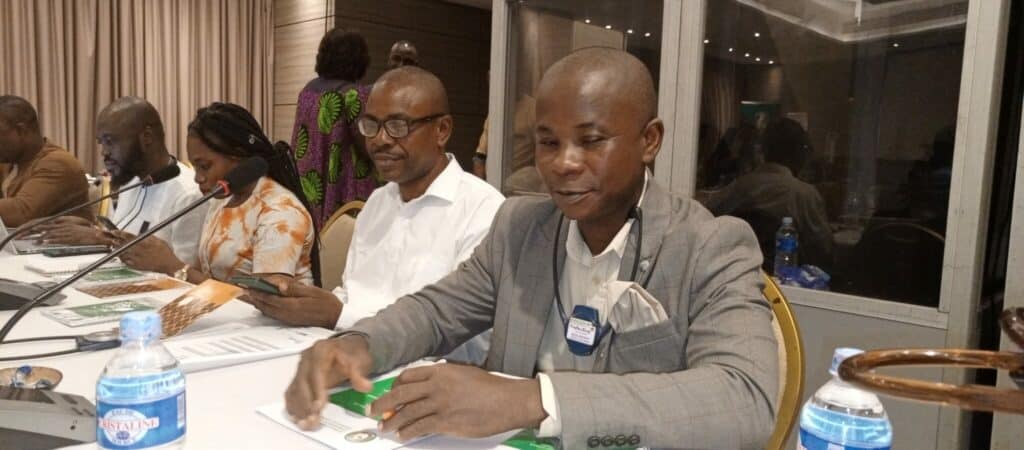
Community-based Response in Tackling Violence, Human Trafficking, and Organized Crime
Initially, he provides more details about the specific challenges West African communities face with organized crime and violence. “Some of the more emergent challenges are artisanal gun and weaponry, arms trafficking, human trafficking, fraudulent medicines, artisanal trafficking, money laundering, force recruitment, extension to illicit use of drugs and prostitution in mining sites, toxic waste dumping.” Others include election-related violence, youth inclusion, and land management.
To adequately address those vast challenges, he believes in the importance of community-based response. . For instance, he shares that a community in Liberia mobilized its people, took action, and broke down a dilapidated structure, which was seen as a criminal hideout and all kinds of illicit activities, including the sale of illegal drugs.
In another example, communities embraced the establishment of Community Justice Teams whereby local community dwellers were trained in skills needed for better community participation- and a better understanding of the importance of a harmonious society. “They were trained in alternative dispute resolution and mediation skills to resolve disputes before they could reach the point of violence or need to be taken to the Police station or the Court”, John shares. These mediators are also creating awareness against transnational organized crime to prevent victimization.
[Read HERE more about the Community Justice Team in Liberia]
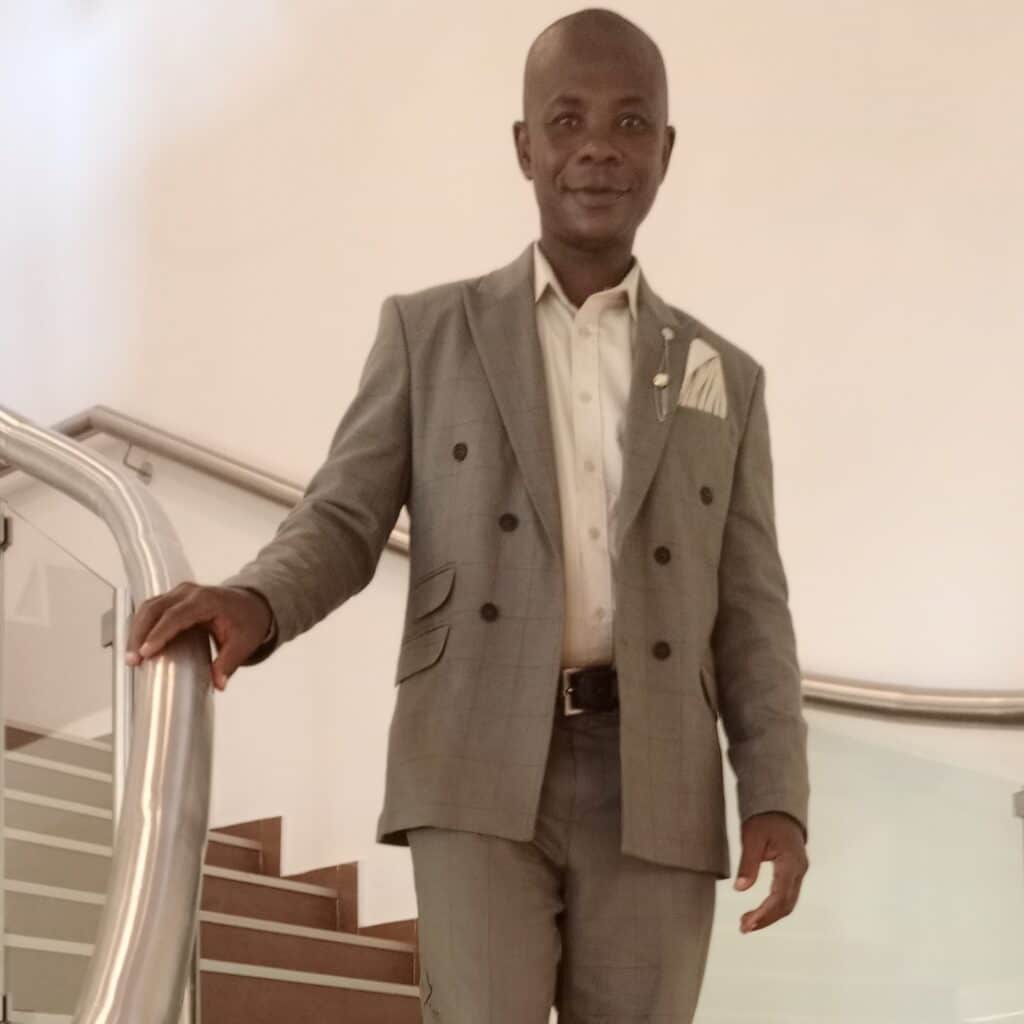
Learning from Opportunities and Long-Term Lessons
John says that WARNOC members faced an important question: how they can sustain the network and what functions and competencies exist collectively that can be harnessed toward continuing the work of the network. “This became critical as the organizations had not previously profiled and assessed how they could use their various functions and fields of expertise to support the effective functioning of the network.” The members were supported to identify the functional areas and strengths and how to use these to contribute to the expansion of the network.
Furthermore, the members highlighted the need for the network to begin engaging with the Economic Community of West African States (ECOWAS) Commission towards forming a partnership agreement. “Such agreements allow us to provide the ECOWAS Commission with credible research results, engage in advocacy at the regional and national level, as well as monitoring and reporting on progress or otherwise, all made to prevent transnational organized crime from negatively impacting communities in the region.” This topic and John’s remarks take greater importance while we acknowledge their importance transcends time.
Envisioning the long-term sustainability of the efforts discussed during the sessions, John shares: “The long-term sustainability was outlined as resource mobilization and institutional capacity building to support advocacy and research activities identified during the workshop.” He believes that establishing a network governance structure, strategic development and action plans, network registration, coordination matrix, funding raising, and communication strategy would benefit the community in tackling this hardship.
Again, speaking from his experience during this trip, he says that youth employment, education against violence, organized crime, and increasing donor support are among the most pressing needs and priorities for addressing organized crime in this region.
He includes the significant role of civil society involved in this process. “We also must work toward increasing civil society involvement to step up sensitization and advocacy for policy formulation and implementation at the national level. Civil society and government partnerships leverage resources for active civil society involvement against organized crime.”
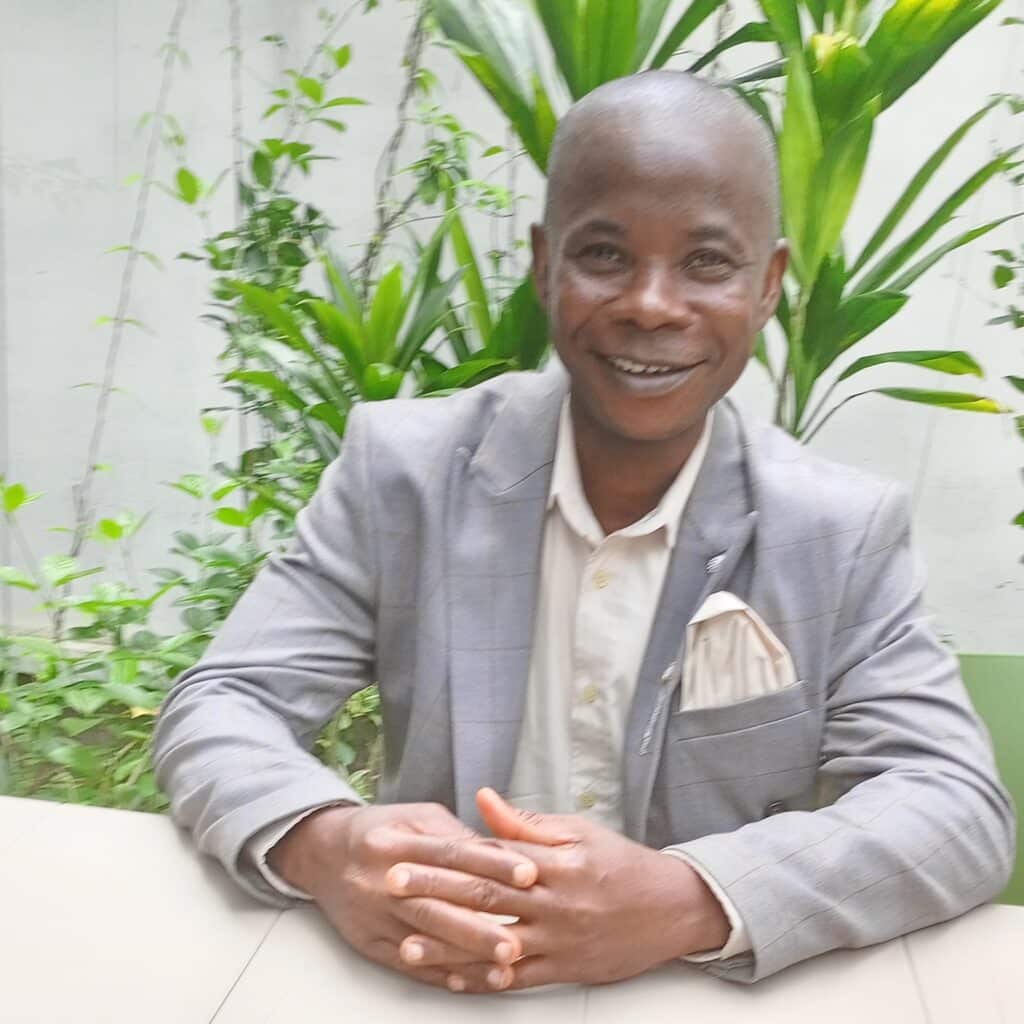
Goldin Lessons: In Community, Everyone Deserves to be Heard
Being a Goldin Fellow has taught him the importance of tailoring any interventions to the needs of the people by planning together with them. “This way, people get involved and take ownership, which is key to sustainability. The lessons I still carry with me today gained from the Goldin Institute are: In community organizing, everyone matters and has the right to be heard in deciding a community’s future despite background or station in life.”
Note: The Functional Focal Areas/Contributions to WARNOC across all member organizations include Research, Advocacy, Communication, Community Sensitization, Mobilization, and Training. Others are Data Collection, Grants and Proposal Writing, and Development of Policy Briefs or Papers.
Three Diverse Voices United during their Goldin Global Fellowship Journey
Coming from different countries and diverse backgrounds, three individuals joined on a remarkable journey through the 2023 Goldin Global Fellowship.
In this piece, Jill Langhus-Griffin from Arizona, U.S., Hajra Hussein from Mchinji, Malawi, and Kurt Isaacs from Johannesburg, South Africa, share their experience with the fellowship and the utilization of the GATHER platform.
They found that despite differences, going together along this path instilled in them a sense of unity and ignited a willingness to work towards the positive changes needed in their respective communities.
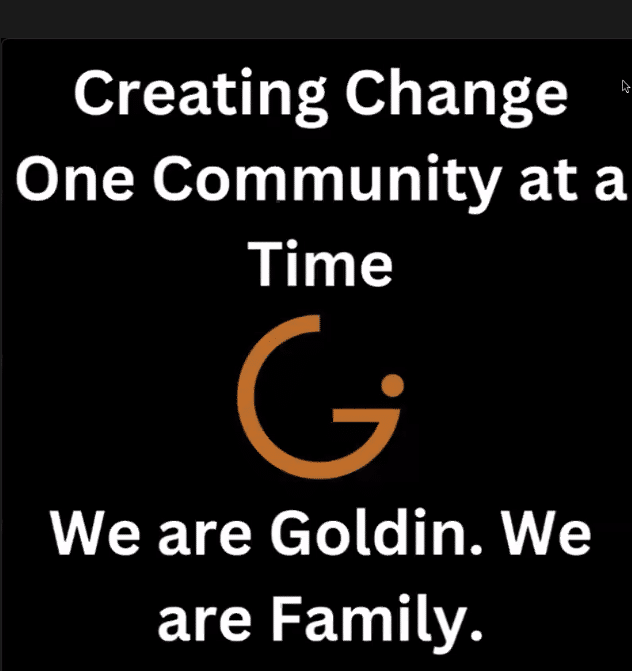
Jill’s Perspective
For Jill, this experience surpassed her expectations in every way.
“This fellowship has been a wonderful experience so far, even better than I had anticipated. I love connecting with like-minded, peace-focused humanitarians who are on the same page as me, are forward-thinking, solution-oriented, and optimistic about the future.” she says.
The course content resonates with her existing beliefs while pushing her to new heights.
“The content in the course is helping me to grow and learn even more personally and professionally. I also really appreciate the program’s collaborative tone and overarching goal.” concludes Jill, the founder of Liluye, a global collaborative community focusing on prevention, economic empowerment, and healing of trafficking survivors.
Kurt’s Perspective
Kurt, a certified Life coach with over 20 years of therapeutic experience in the counseling and education-management space, was immersed in a welcoming sea of knowledge and motivation within the GATHER Program.
“Goldin Global Fellowship and the GATHER platform are really welcoming and inclusive. The program is well thought through and structured. It is littered with titbits of knowledge and motivational material that challenge and shape my thinking.”
Kurt adds that in this environment, learning happens organically.
“I have found the one-on-one conversations most inspiring. As the weeks progressed, the exchanges began moving towards collaboration. This excites me, ” says Kurt, cheering on the possibilities and visions this program brings.
Hajra’s Perspective
For Hajra, GATHER is synonymous with effective communication, cooperation, and diversity.
“GATHER is helping me to communicate, collaborate, and feel more connected in a persistent space that reflects me to create a unique team with different people from different countries.” she says.
She highlights that this also encourages participation to achieve overall satisfaction.
Goldin Global Fellowship Building Global Connections
Jill, Kurt, and Hajra are among the outstanding 2023 Goldin Global Fellows who live and work in Albania, Bangladesh, Burundi, Cameroon, Ethiopia, Haiti, India, Kosovo, Malawi, Mali, Nepal, Nigeria, the Philippines, Senegal, South Africa, Sri Lanka, Tanzania, the United States and Zimbabwe.
We are already witnessing the global marks and ties this diversity of fellows brings to communities, as Jill and the other fellow Tarun Masapeta from Hyderabad in India met in person in Phoenix to discuss the possibility of a partnership between their two organizations (@liluyespirit and @projecteifl) to create a financial literacy program for trafficking survivors in the U.S., with a plan to tailor it to other areas of the world who could benefit from this training.
For this, Jill shares:
“I plan on working together to co-create a financial literacy program for trafficking survivors in the future with one of my fellows, Tarun, who runs EIFL, an organization that focuses on educating and empowering marginalized groups. I am very much looking forward to seeing this program come to fruition and impacting and empowering many women who need this information to grow, thrive, and reintegrate into society.”
As the fellows shared their impressions, it was evident that the power of collaboration and the potential for positive change worldwide is only strengthened by safe spaces, such as GATHER- which remains an inspiring place for others who seek out opportunities and networks for driving change in their community from within.
For this, Yusuph Masanja, Co-Facilitator of the Global Fellows Program, who himself went through this journey, highlights that this cohort represents 20 grassroots leaders from 19 countries.
“Their diverse backgrounds, unique talents and gifts, and commitment to making progress in their communities inspire hope for our shared future. Excited to see where our learning journey takes us together.”
The 21st Anniversary of the Goldin Institute: Celebrating Community-Driven Social Change
My memory of the Kosovo War in the late 1990s is somewhat blurry. Glimpses of paramilitary uniforms, burned houses, gray piles of debris, and crying children remain scattered in the back of my mind. This is where we put our most difficult memories to gather dust. However, the dust fails to erase their existence.
I was barely a kid and could not comprehend the wounds such cruel actions leave in the community. It is a lived history about which I am penning for the first time.
Flash forward to two decades later, I am in Chicago, U.S., studying Media Literacy and Communication as a scholarship holder from the U.S. Department of State through the Community College Initiative (CCI) Program, where an acquaintance told me about the Goldin Institute.
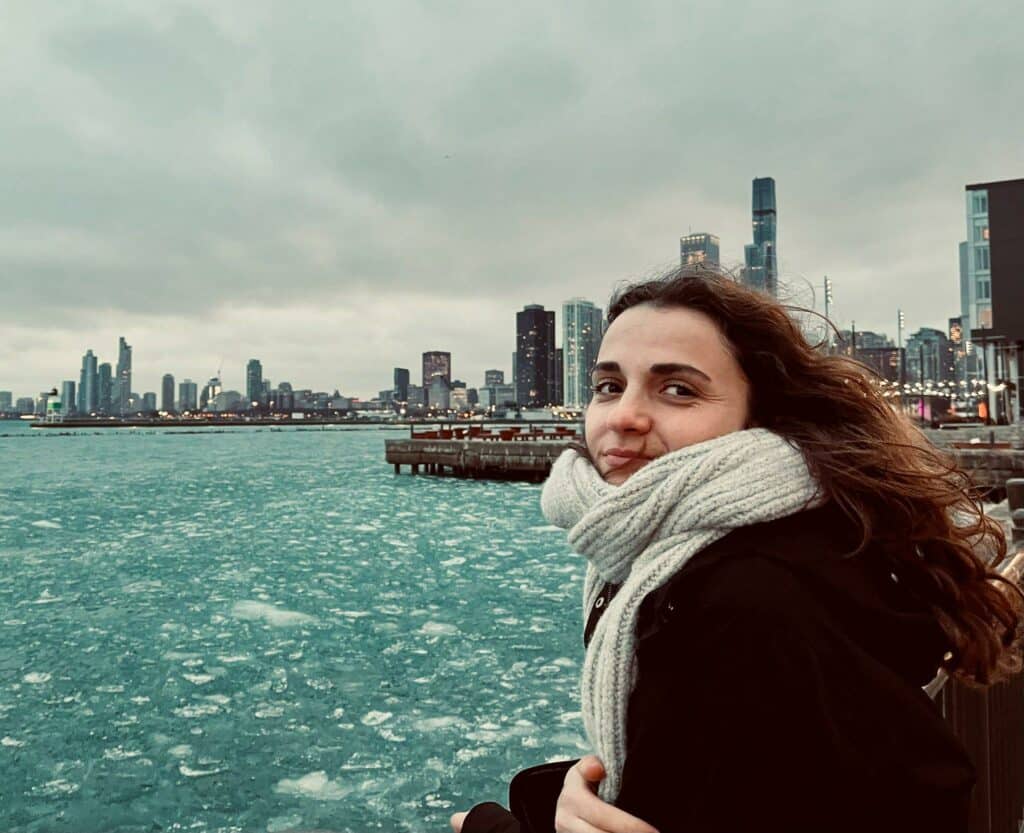
It is undoubtedly not a coincidence that I am touching upon my vague war memories for the first time for a Goldin Institute piece.
I was particularly drawn to the Goldin Institute’s core belief that change should come from the bottom. I applied and was accepted for an internship at Goldin. I was honored and delighted to join the Institute’s efforts in orienting its mission and activities to make this a reality for as many people as possible.
Since its establishment 21 years ago, the Goldin Institute has believed that real and lasting social change requires those within the community who are closest to the issue to have leadership voices and decision-making power; only then can we see the creation of a more just, peaceful, and sustainable world. This is where the Goldin Institute’s mission and my story, beliefs, and ideals cross paths.
People who lived through similar experiences of war and other realities that require social change deserve to tell the story and find a way to rebuild their communities for good. Building stronger communities requires listening to those impacted by social issues, and the Goldin Institute has, for the last 21 years, offered a global platform and a supportive community to facilitate this.
In honor of the Goldin Institute’s 21st anniversary and my almost one-year journey with the organization, in this article, I touch upon three shaping experiences for me.
The Beginning of my Journey
I walked into the Goldin Institute office in Chicago for the first time on a cold Tuesday in February. What first caught my eye was the wall filled with smiling portraits of the Chicago Peace Fellows and the Goldin Global Fellows.
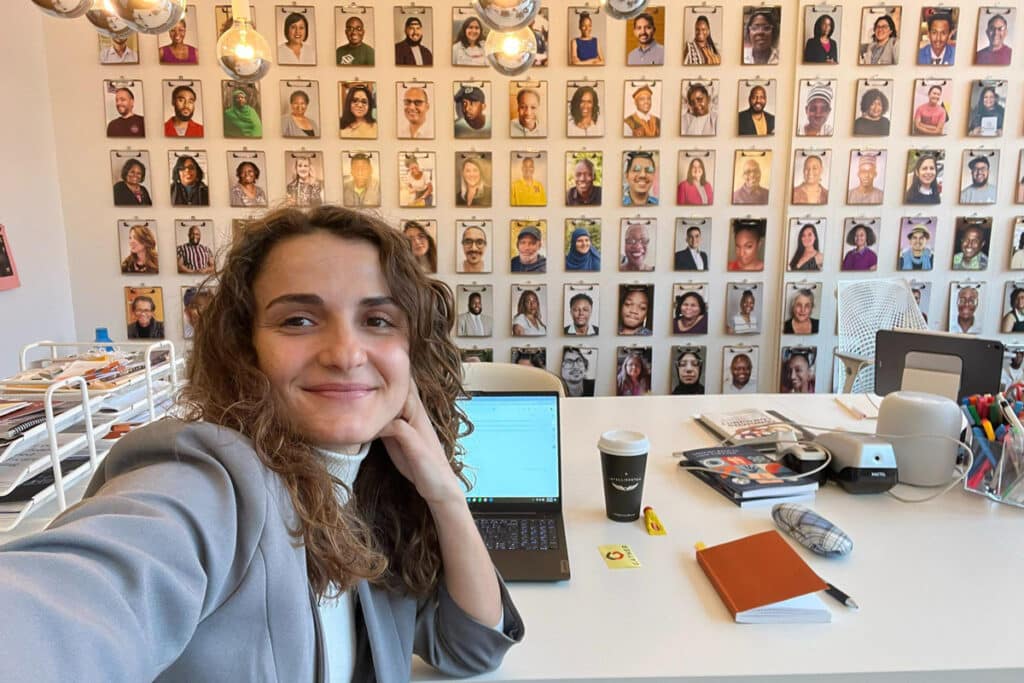
I had read about the Goldin Institute’s work and activities before joining them. However, only upon seeing the work firsthand did I gain a thorough understanding of the actual scope of its honest dedication and embodiment of equity and justice as the core values of community-driven social change.
From February to June 2023, I joined the team as a Communications Associate; I mainly worked on highlighting the Global Fellows’ and Chicago Peace Fellows’ success stories and assisted in various other daily tasks.
This was an inspiring journey, giving me a better insight into how the Institute’s Fellows programs impacted the Fellows and their communities. I interviewed a few incredible individuals from Chicago, South Africa, West Africa, Nepal, Philippines, and these are a few who inspire me:
Nicole “Coco” Davis, 2021 Chicago Peace Fellow and CEO/President of Talk2mefoundation: Coco took young Chicagoans on a trip to Camp Duncan to support kids whose parents and caregivers are incarcerated and need healing and peace. Thanks to the generous support of her peers in the Chicago Peace Fellows Mutual Aid Collaborative, she made it possible for these young people to socialize, learn, exercise, and dance together.
“They say money cannot buy you happiness, but the Goldin Institute brought 25 smiles for youths at Camp Duncan.”
– Coco Davis
Dieudonne Allo, Global Fellow and CEO of Global Leading Light Initiatives, and Fatima Momoti, Program Coordinator: Marking International Women’s Day, Dieudonne and Fatima shared more about their success with Ibali Lam. This program provides women entrepreneurs with digital tools and innovative approaches to storytelling to connect them with existing and new customers and investors.
“The GATHER program of Goldin Institute inspired the model of Ibali Lam. Women, especially in this part of the world, do not have access to technology, so we give them access; we provide internet data so they can access the online platform. Women get tablets, too.”
– Dieudonne Allo
Andy Alegre, 2021 Goldin Global Fellow from the Philippines: among others, shared a few tips on working with people from diverse backgrounds while respecting their differences to solve issues affecting the community. Andy also emphasized the importance of being a Global Fellow and how it has offered him global perspectives obtained from his peers during the weekly discussions. While discussing influential resources, Andy mentioned the GATHER platform.
“The GATHER platform tremendously contributed to my learning as a professional and community activist. The platform was easy to navigate and use and facilitated intuitive and practical learning by providing useful concepts and examples for community leaders like me.”
– Andy Alegre
Evolving into a Fellow
Hearing directly from Fellows made me appreciate the organization’s approach. Upon returning to Kosovo after my internship, I was encouraged to apply for the 2023 Goldin Global Fellows program. This saw me evolve from being an intern for four months to one of the 20 chosen Goldin Global Fellows. I became the first Fellow representing Kosovo.
Although I already had a general picture of the Fellowship and its immense impact on community activists, it was only while being part of it that I fully understood its importance in uniting and bringing activists together to hold timely and important conversations.
We shared our backgrounds, passions, and motivations and set the terms for global cooperation, such as that of two remarkable peers, Jill Langhus-Griffin from Arizona and Tarun Masapeta from India, who have created a financial literacy program for trafficking survivors in the U.S.
It was at this point that two notable things happened for me: 1) I gained a fresh perspective on my community assets, and 2) I became part of the Gather Care team.
A Fresh View of My Neighborhood: One of the Fellows’ first assignments was to walk through our neighborhood and identify the existing assets within our community assets, rather than focusing on what is lacking.
Unlike how I was used to seeing community deficiencies most of my life, this approach was entirely authentic and fresh and impacted my long-term thinking, too. After this, I walk through my neighborhood differently. I reflect on the asset map I created, highlighting more of what we have rather than giving power to what we lack.
This approach gives Fellows a life-learning lesson and perspective on helping their communities by finding innovative solutions that are authentic to each community. For instance, I listed traditions and coffee shops as existing assets in my asset map. They serve as places and platforms for gatherings, sharing, and a place for community activities. Without this newly gained perspective, I would not recognize the potential in these everyday things.
GATHER Care Platform: Co-facilitating GATHER Care: Caring for those who care for others online forum was an amazing, fulfilling, and tangible outcome from my time as a Fellow. With our peers and people from other cohorts who joined us, we met and discussed the importance of mental health for community activists and came up with solutions to improve the situation.
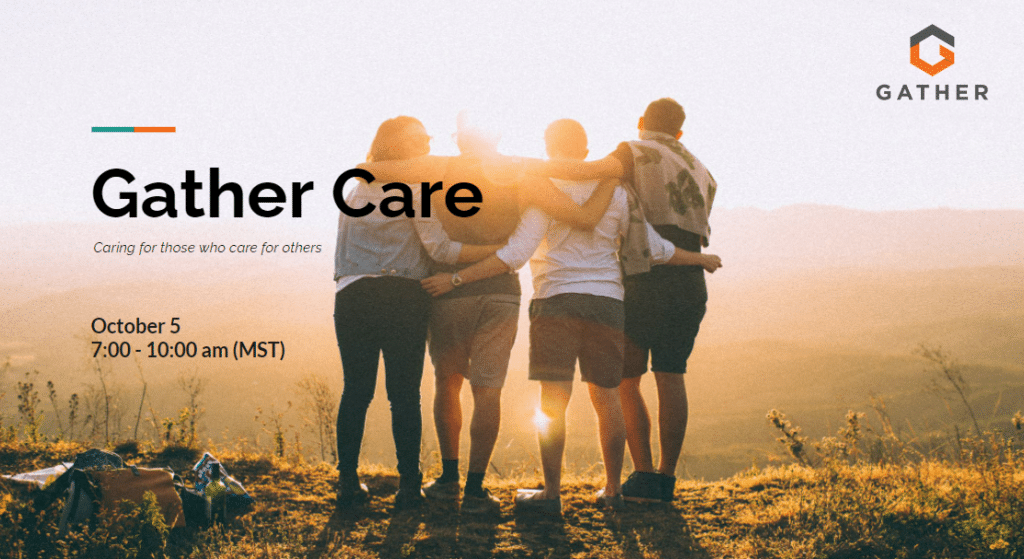
One of the key outputs of this summit was the creation of a Buddy System. Through this system, Fellows who were keen to support each other were assigned voluntarily and matched with another Fellow for additional support, learning, and connection to help alleviate the anxiety that they may be feeling, acknowledging their mental health and well-being as a priority.
We have seven pairs of buddies and are considering extending this system to the next cohort, as it could hugely benefit their well-being.
“It became apparent there was a need and desire within the group to create deeper connections and to support one another.”
– Jill Langhus-Griffin, Creator of Gather Care, 2023 Goldin Global Fellow.
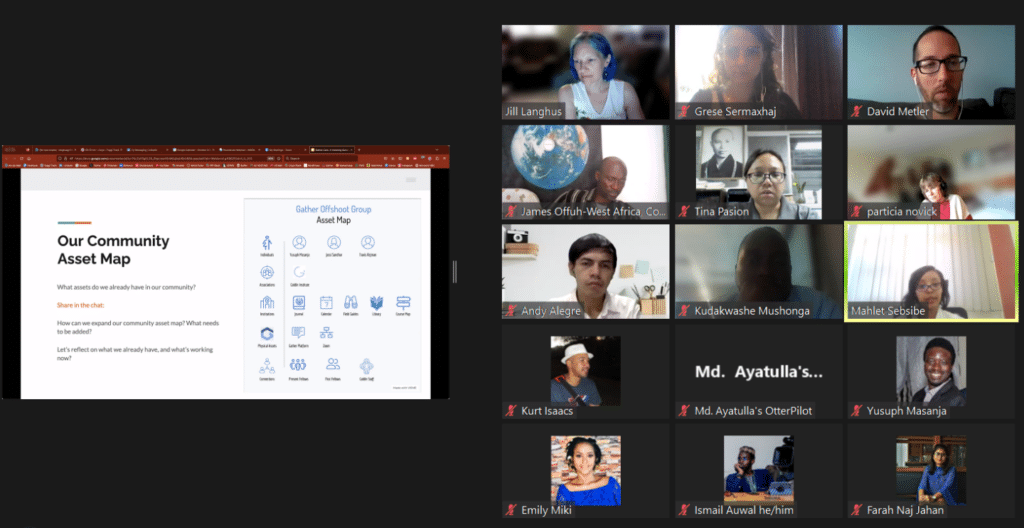
A Global Perspective: From Chicago to Prishtina, Looking Forward
Now, I am back in Prishtina and working for the Goldin Institute as a Media Coordinator. The global nature of the Goldin Institute’s work fits my current remote engagement, offering me a say and participation in community work that, to date, touches over 100 cities in over 40 countries to build meaningful partnerships rooted in the needs and assets of local communities.
Coming from and living in a small country in the Western Balkans, with its socioeconomic struggles, makes my engagement with the Goldin Institute of unique significance and potential. Since joining the team, I evolved my perspective on my role in my country’s history and its community-driven solutions. I have adopted a more proactive approach to participating in socioeconomic narratives, community discussions, and initiatives.
As each day goes by, my interest and engagement in my community continue to grow, thanks to the supportive environment provided by the Goldin Institute, including its dedicated team and inspiring Fellows. In the five months I have been back from Chicago, this fellowship has greatly complimented my work and goals.
For me, being part of the Goldin Institute is meaningful because it lets me connect with peers from around the world who have been through destruction and social upheaval. It has been mighty for me to learn what other Fellows and community activists are contributing to their communities, and I know that they will be there for me in the future, too- just as I will be there for them.
Today, on behalf of the Goldin Institute, I extend our wholehearted thanks to our supporters, Fellows, and partners for believing in and standing with us as we look forward to entering a new decade and expanding our impact and global network.
As the Goldin Institute will open its doors in Colombia and Tanzania, establishing two new offices in these countries, we remain committed and optimistic for a future that facilitates community-driven social change through and with grassroots activists.
